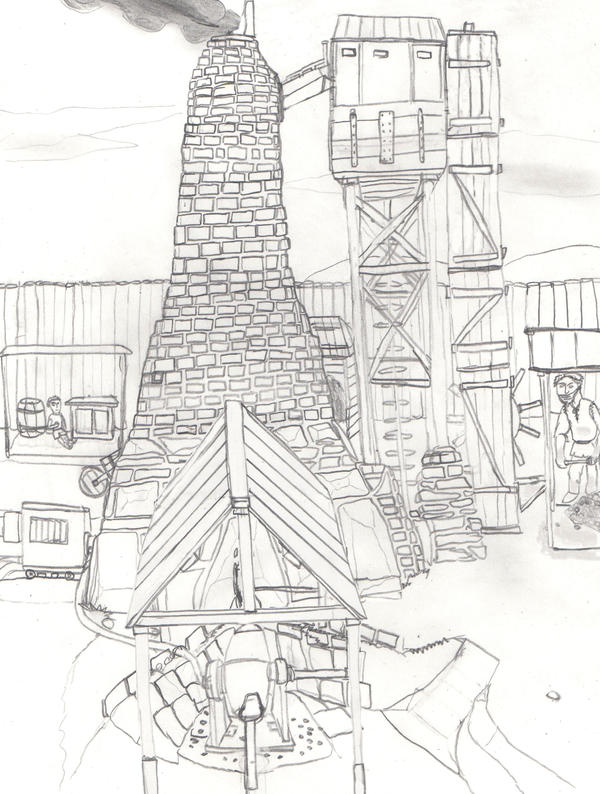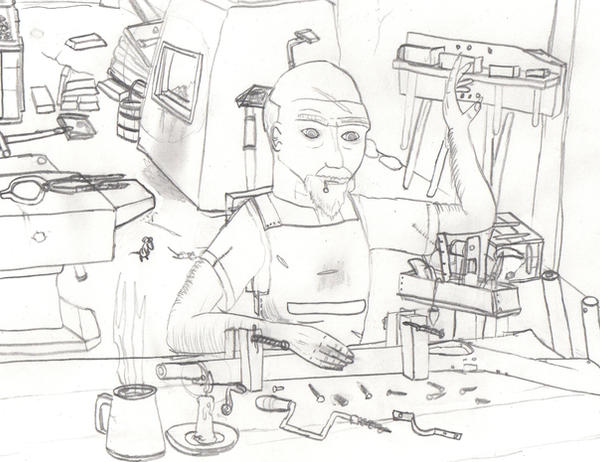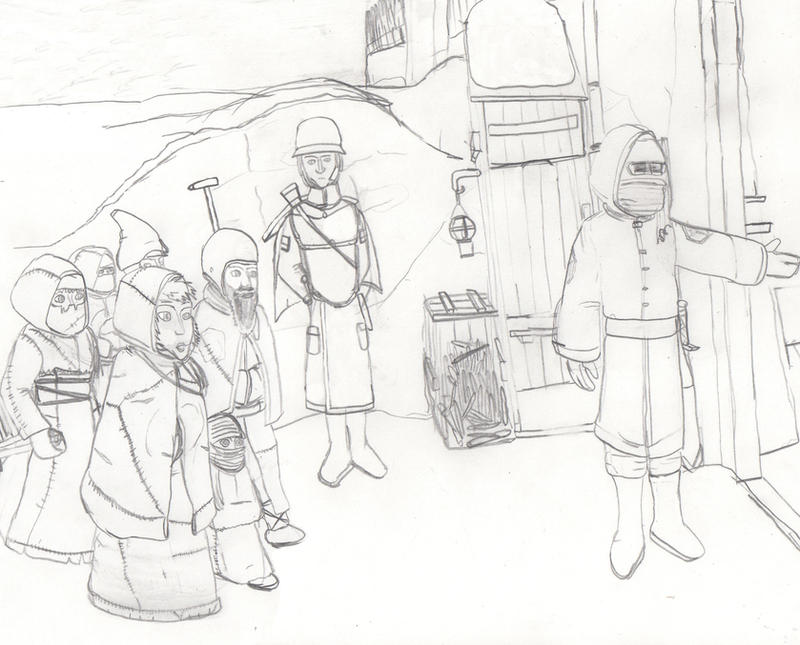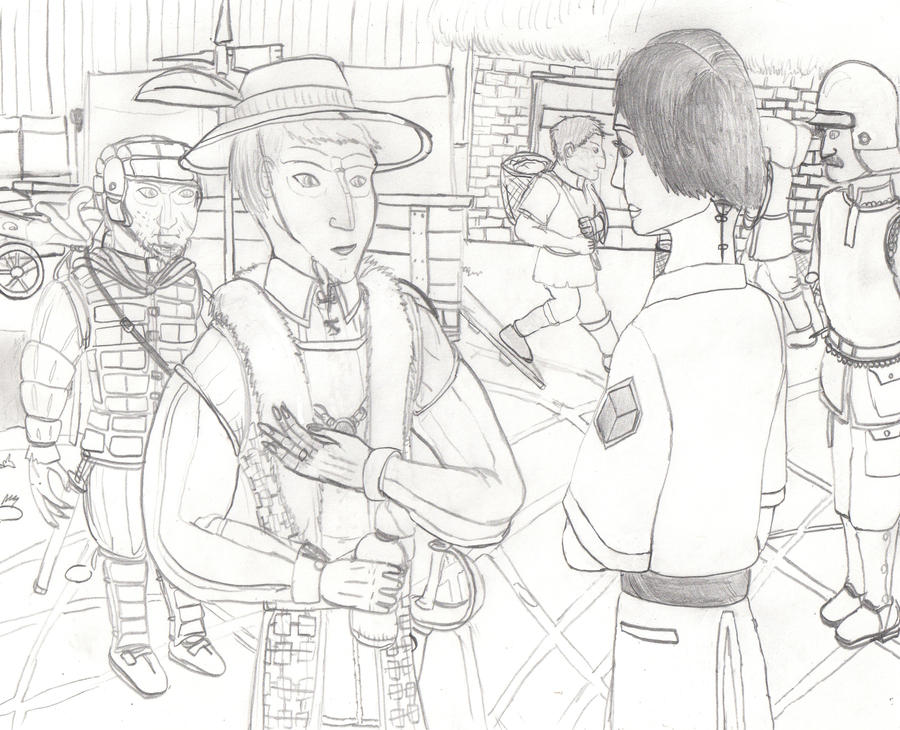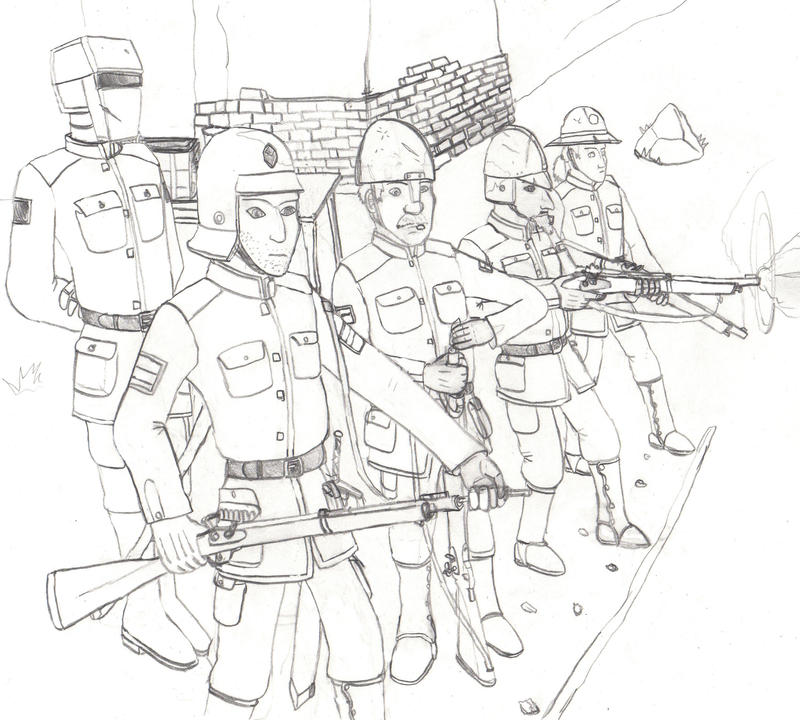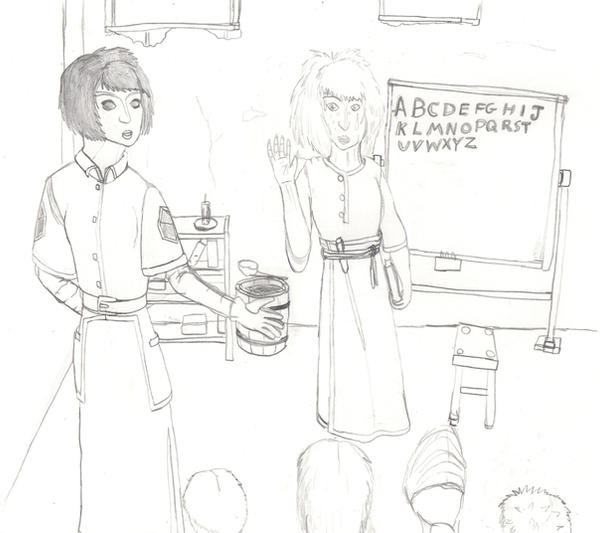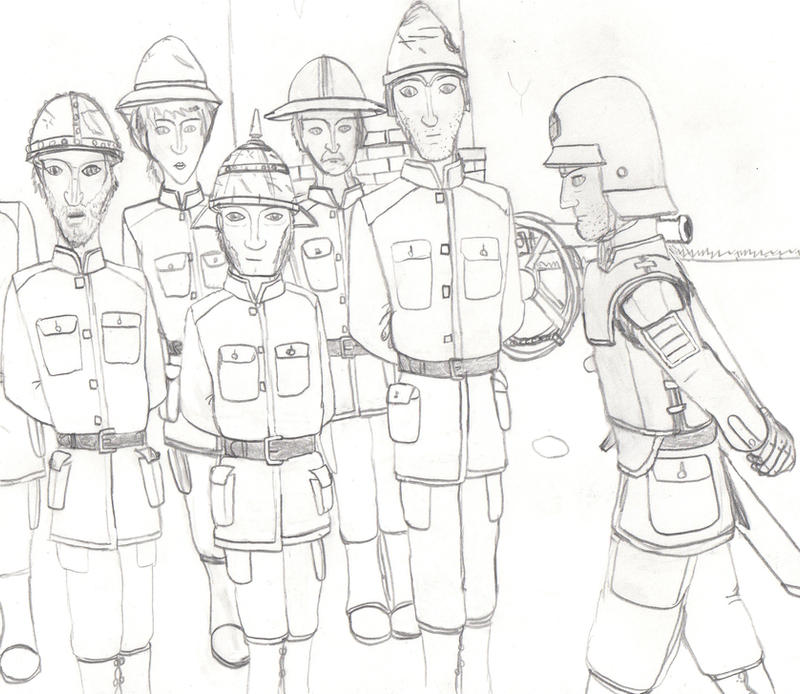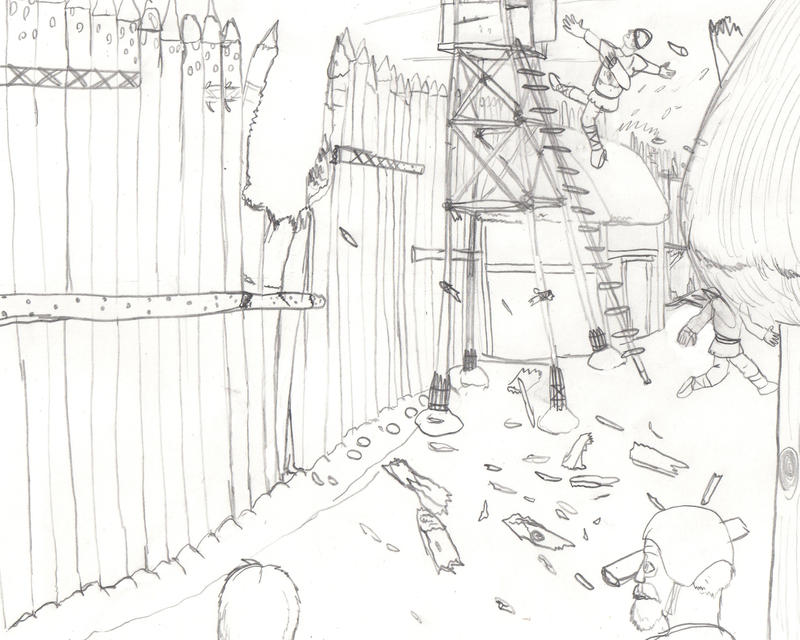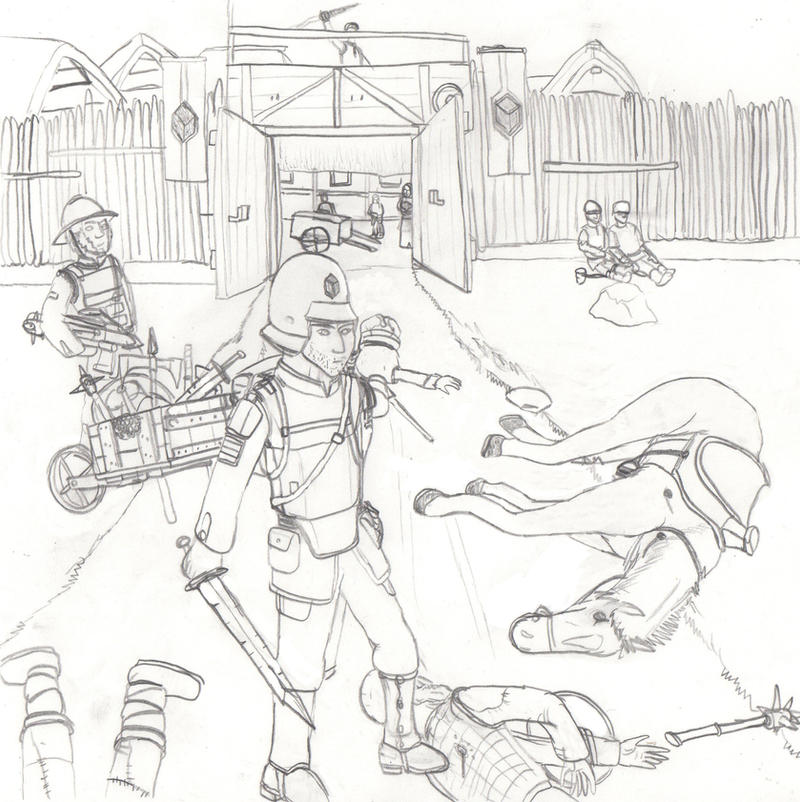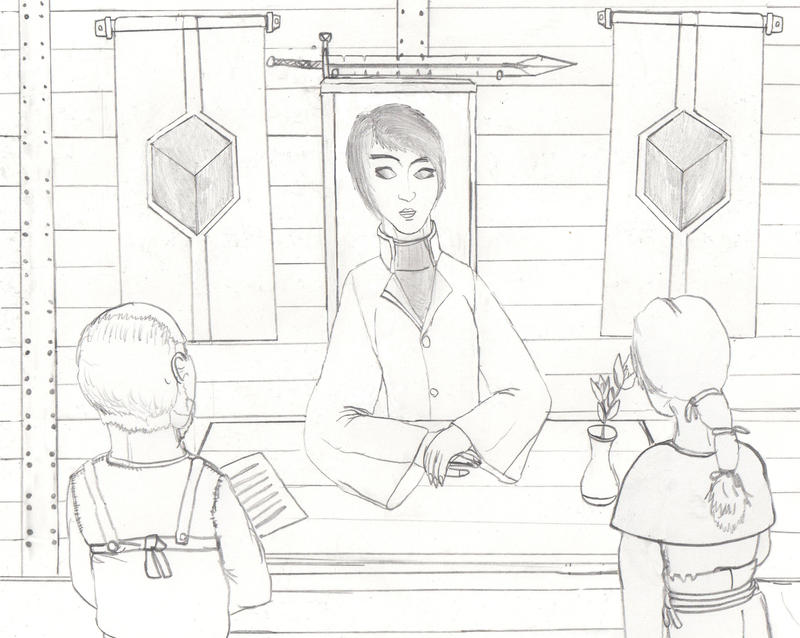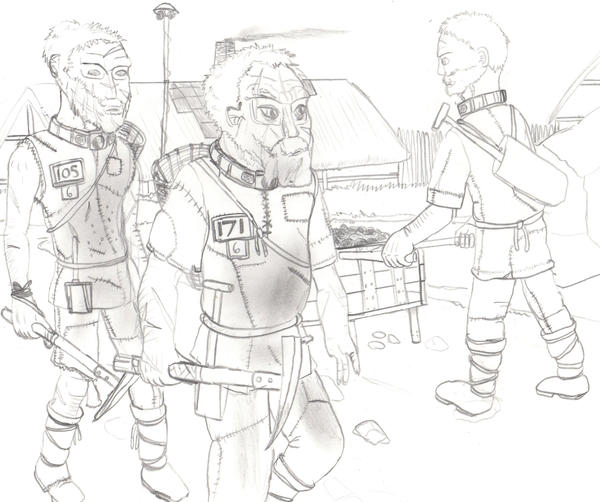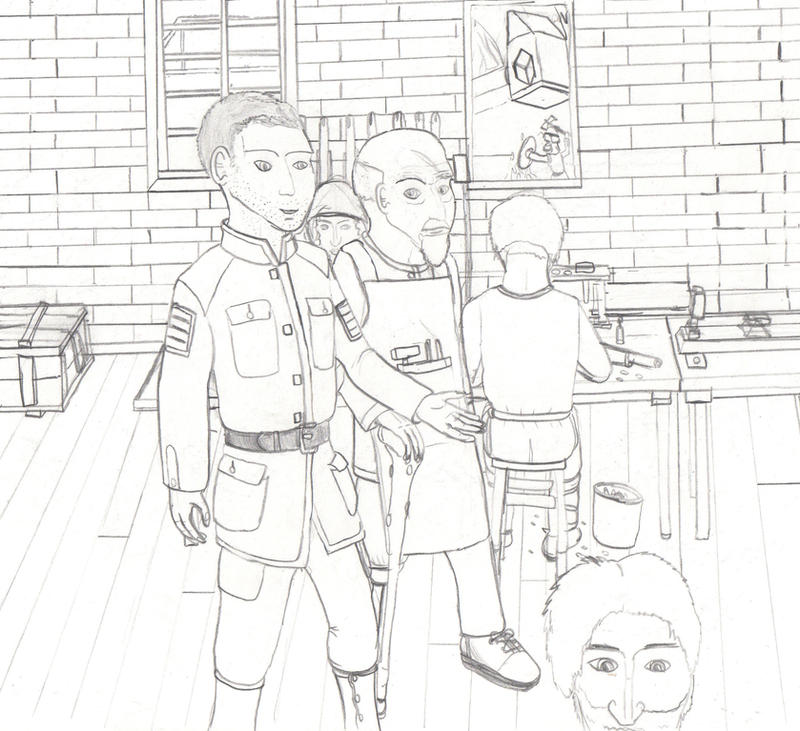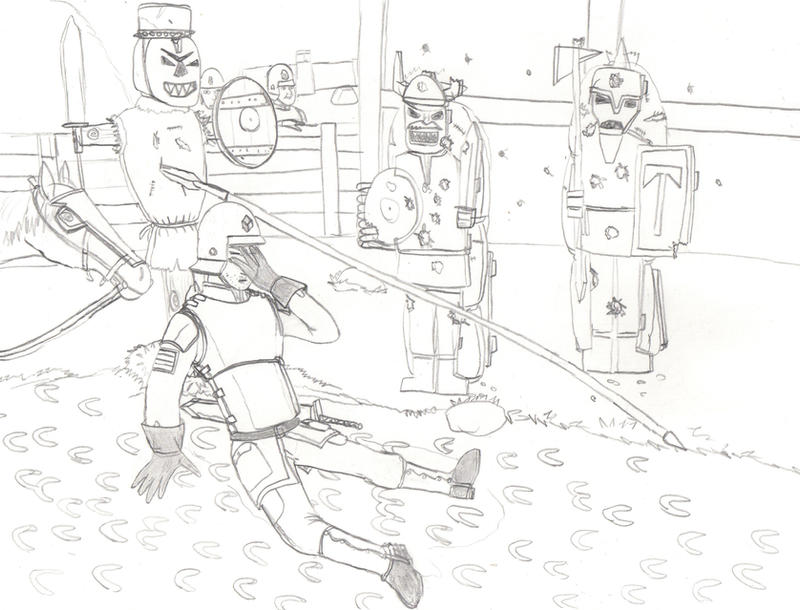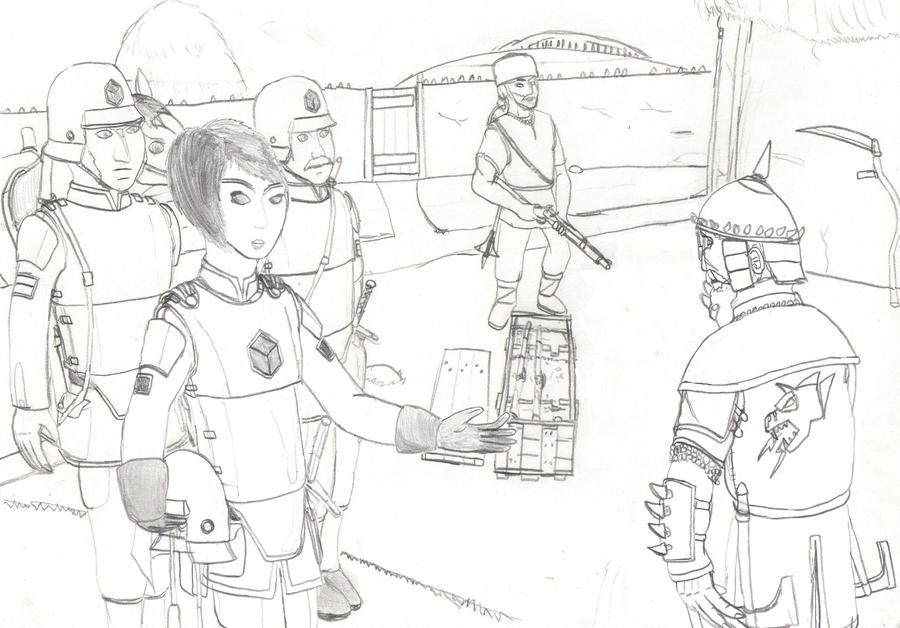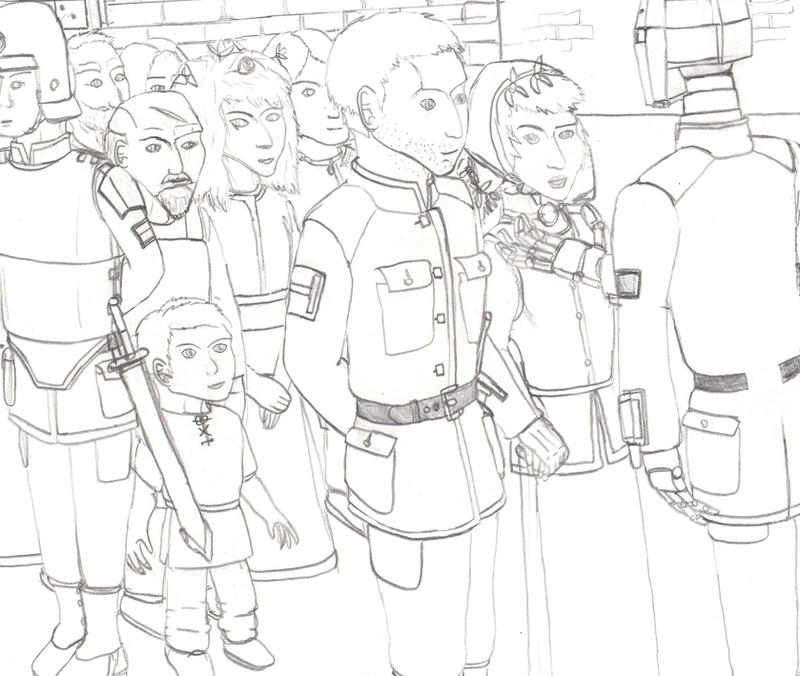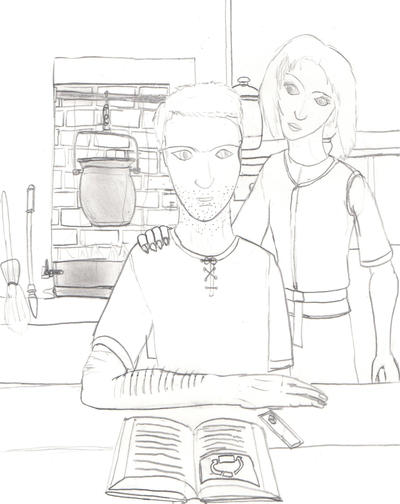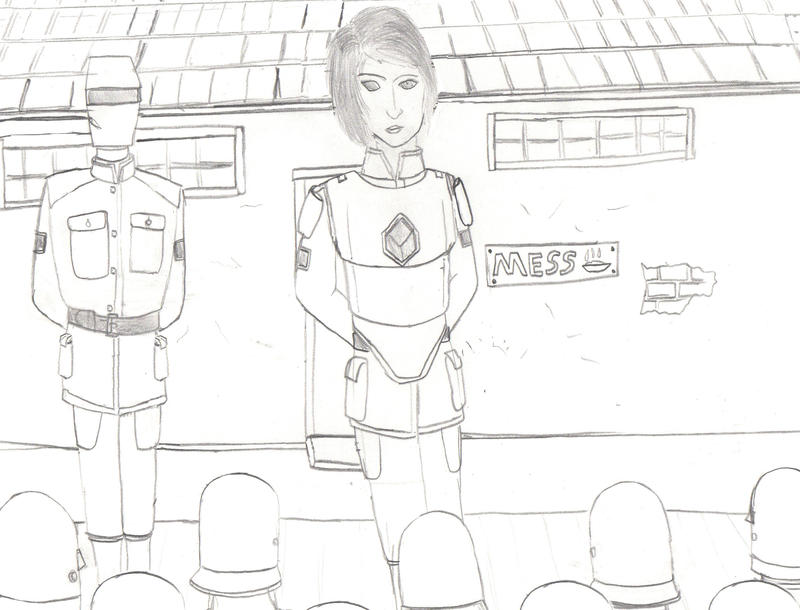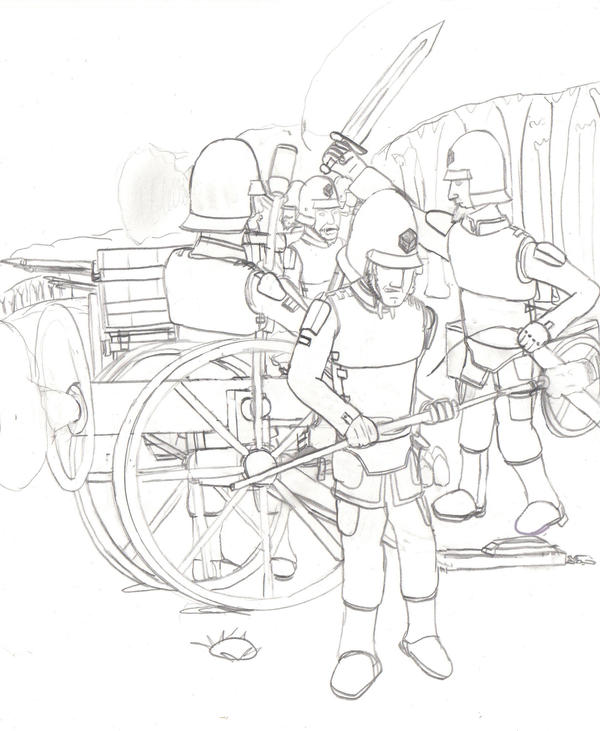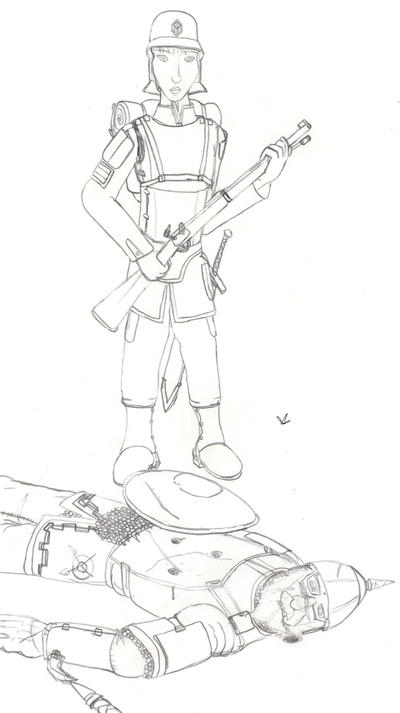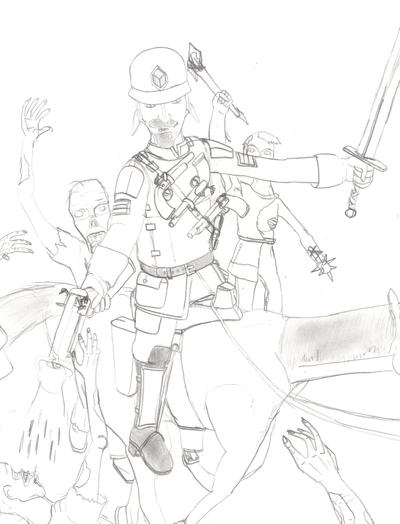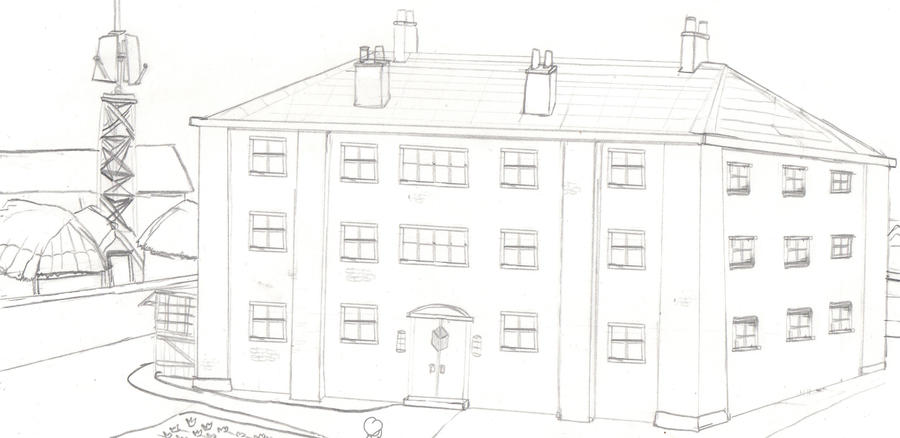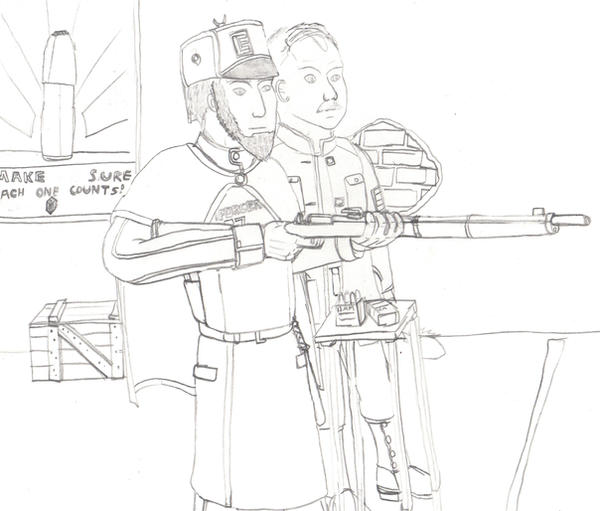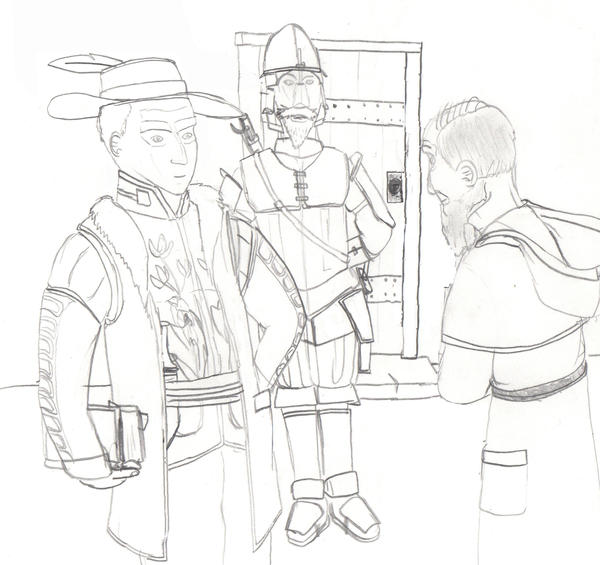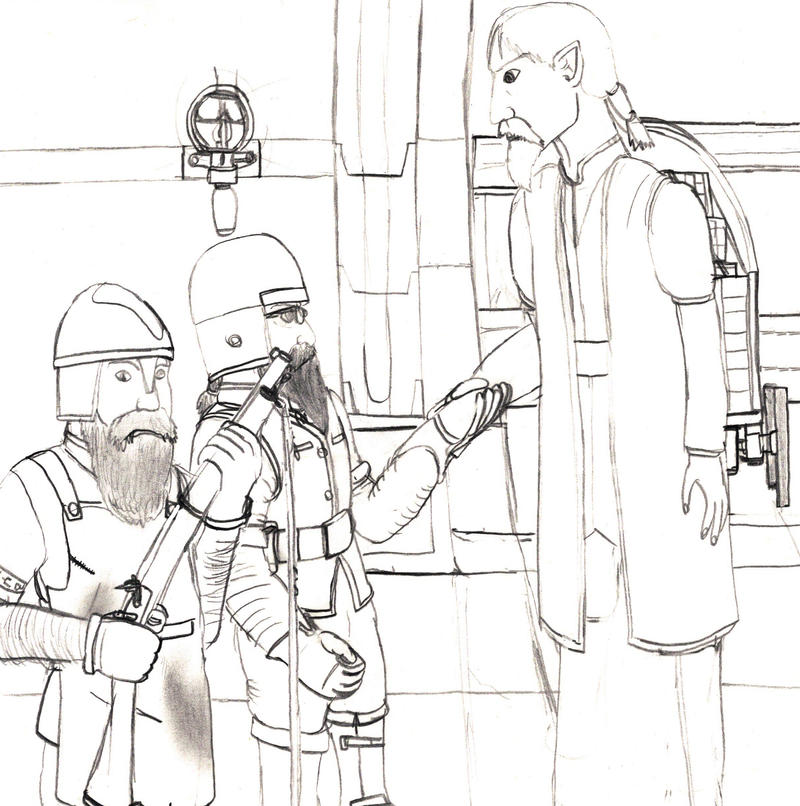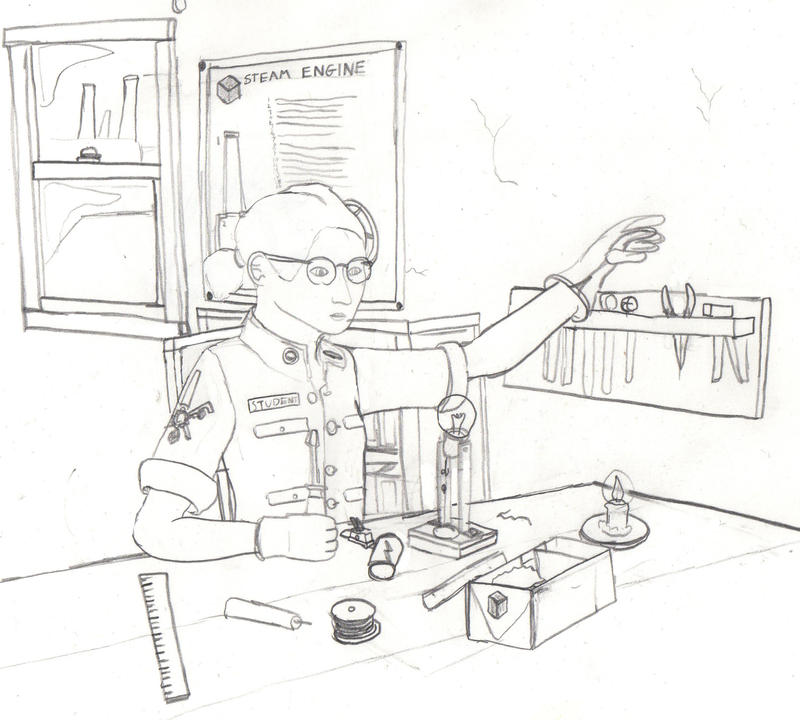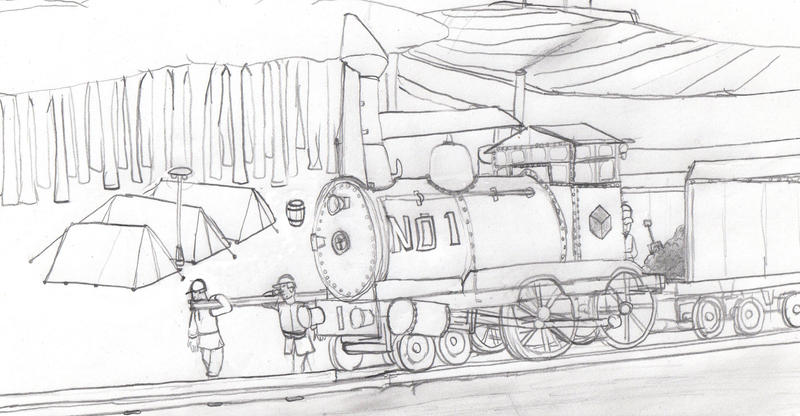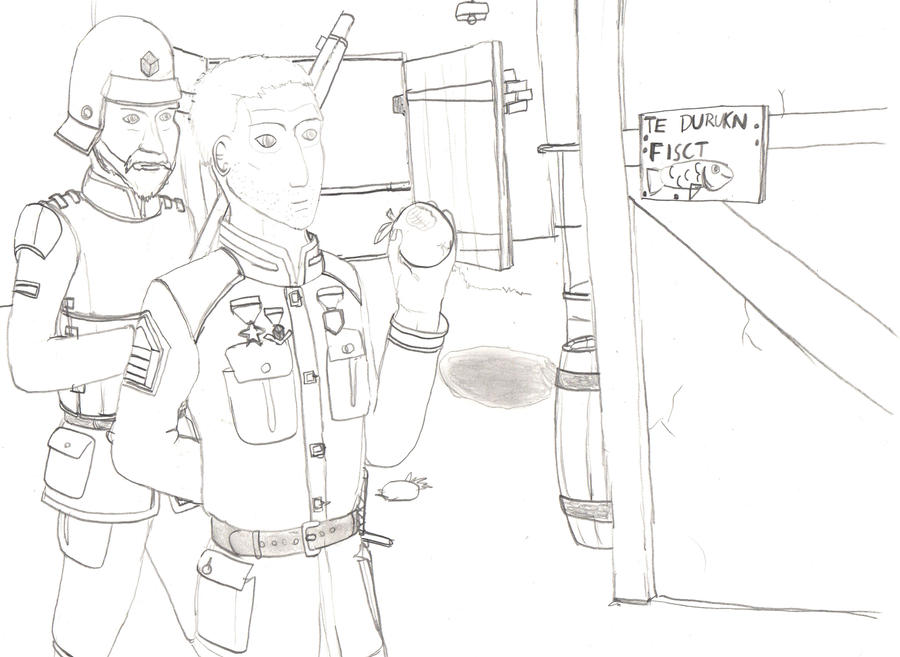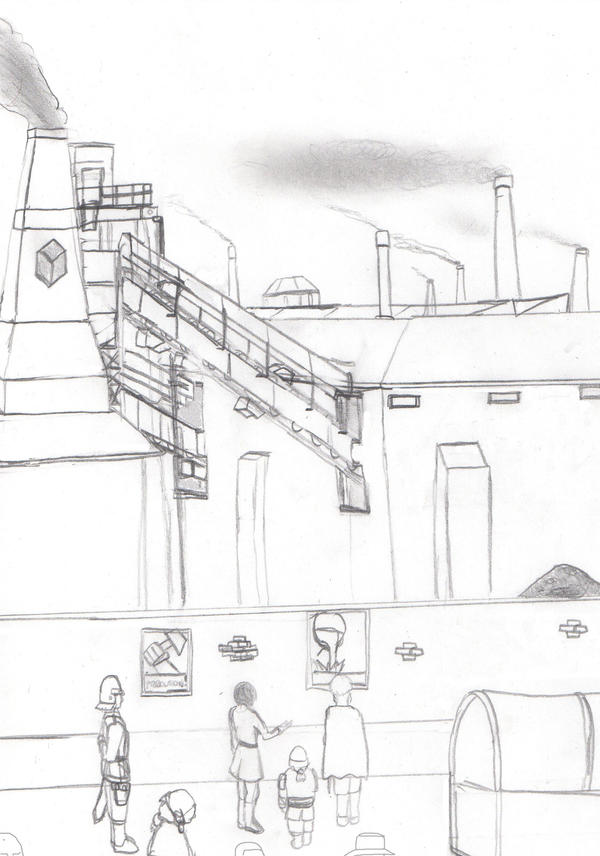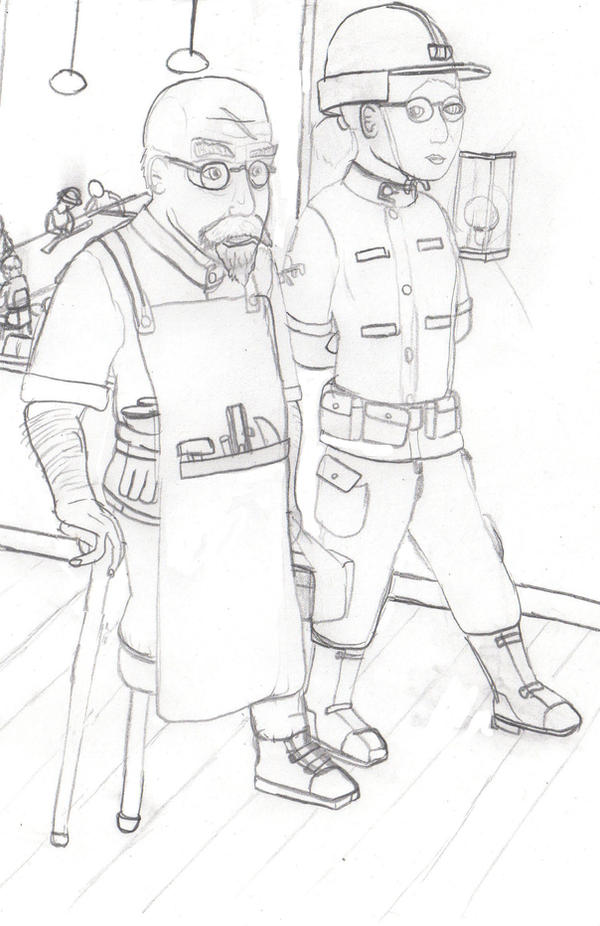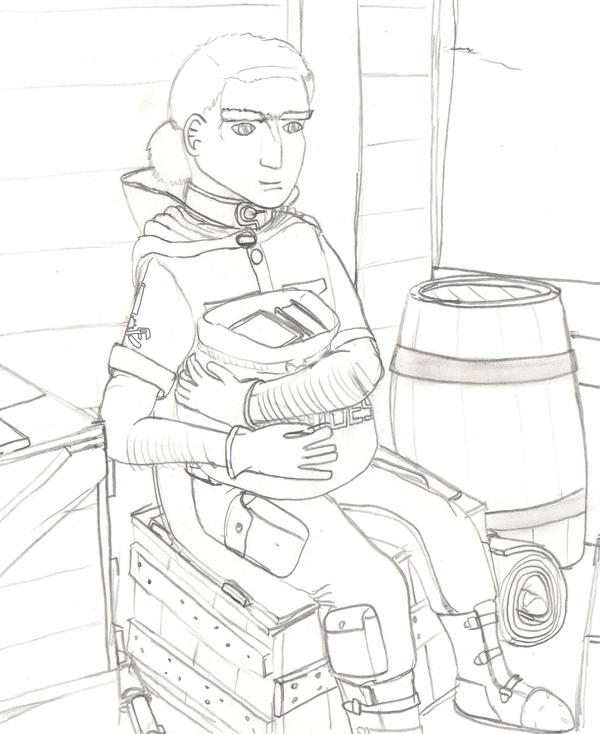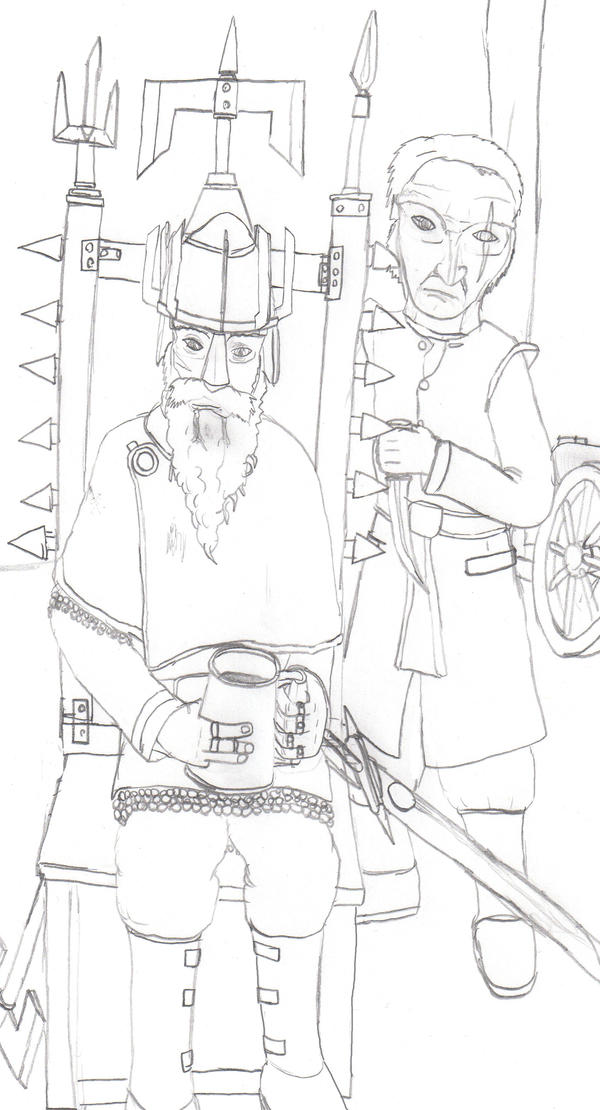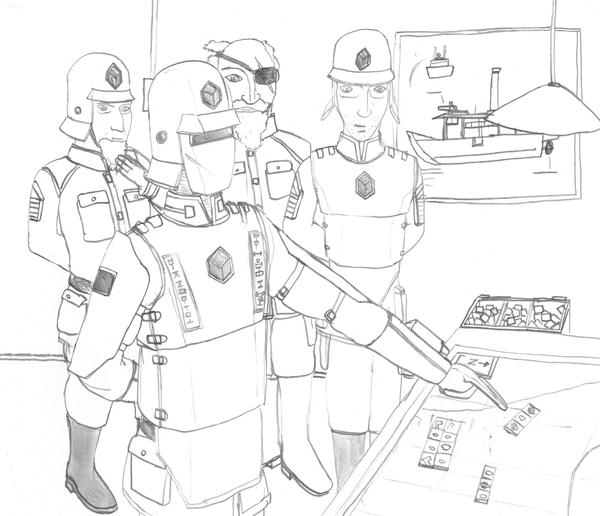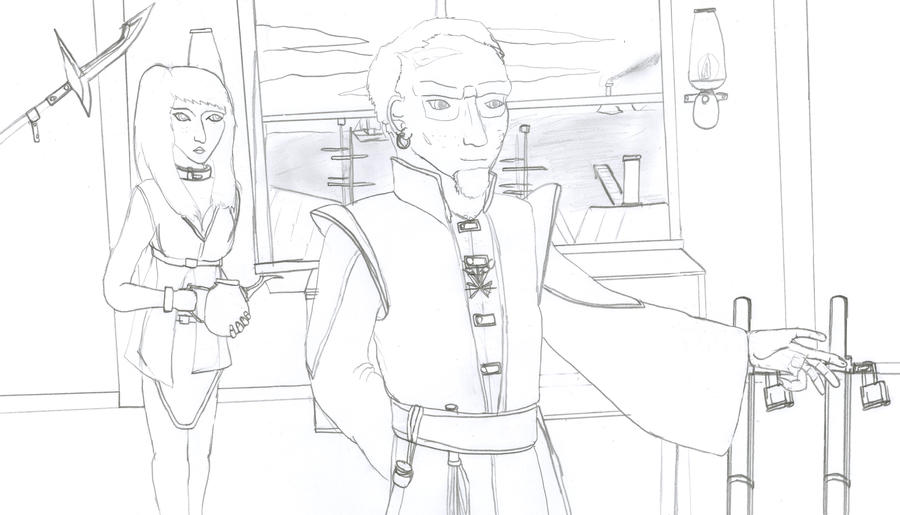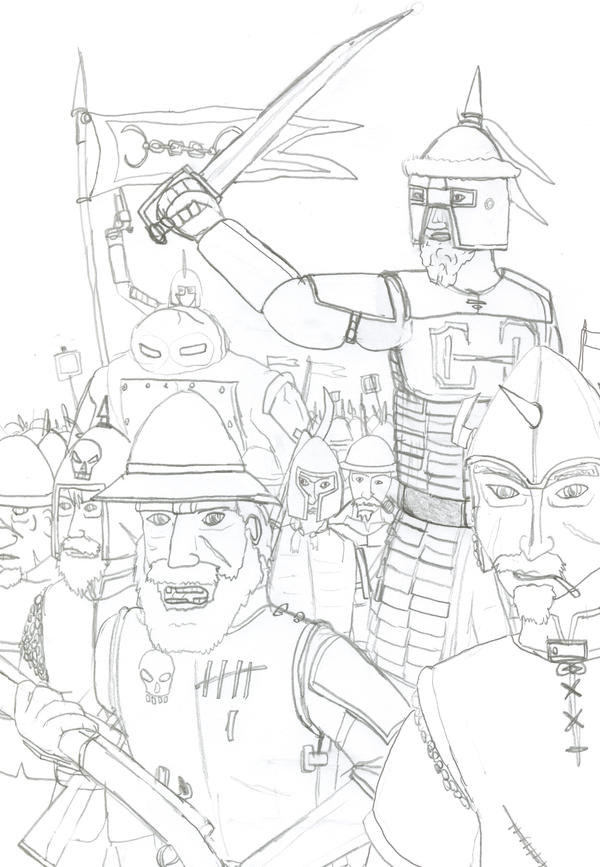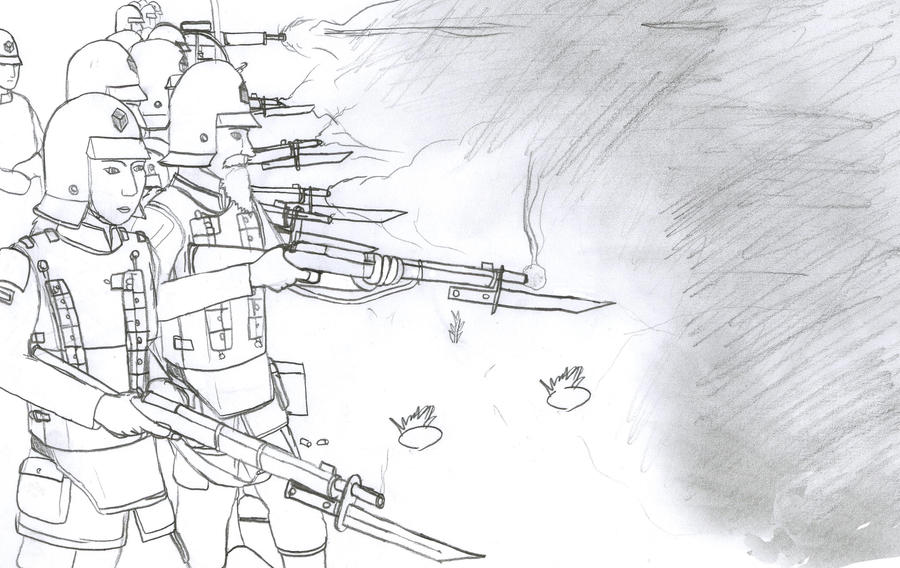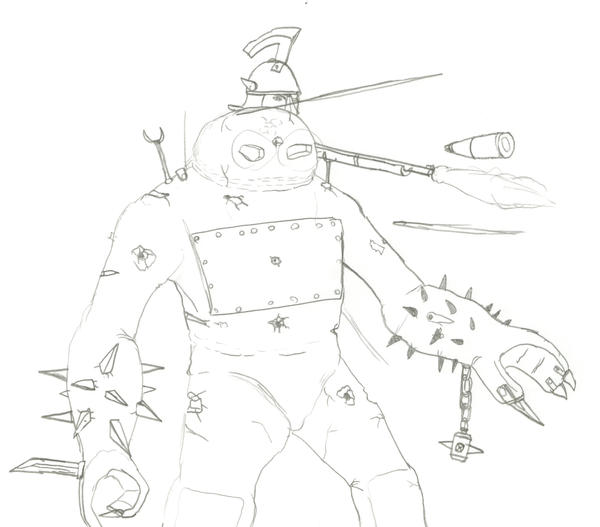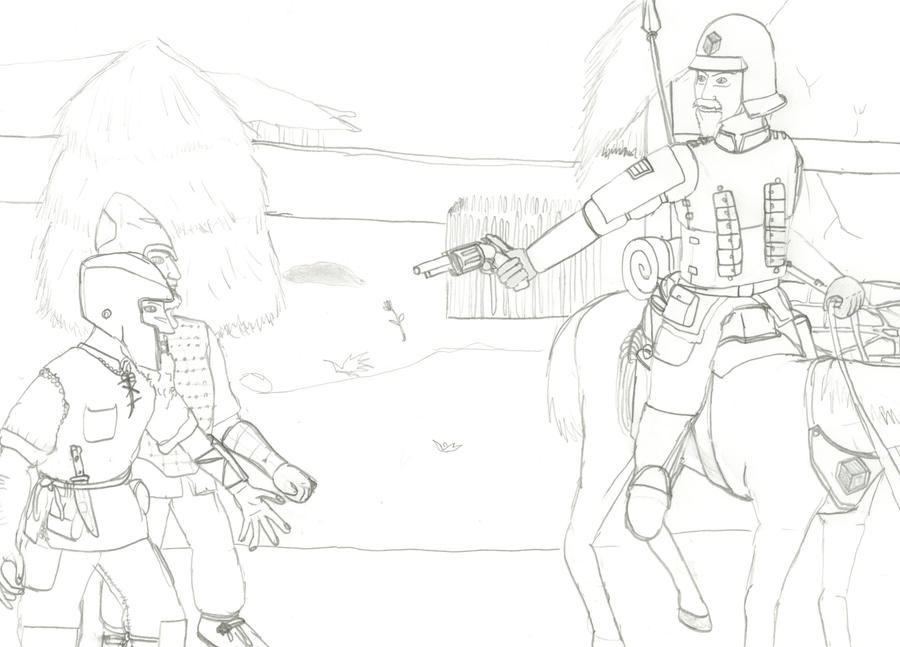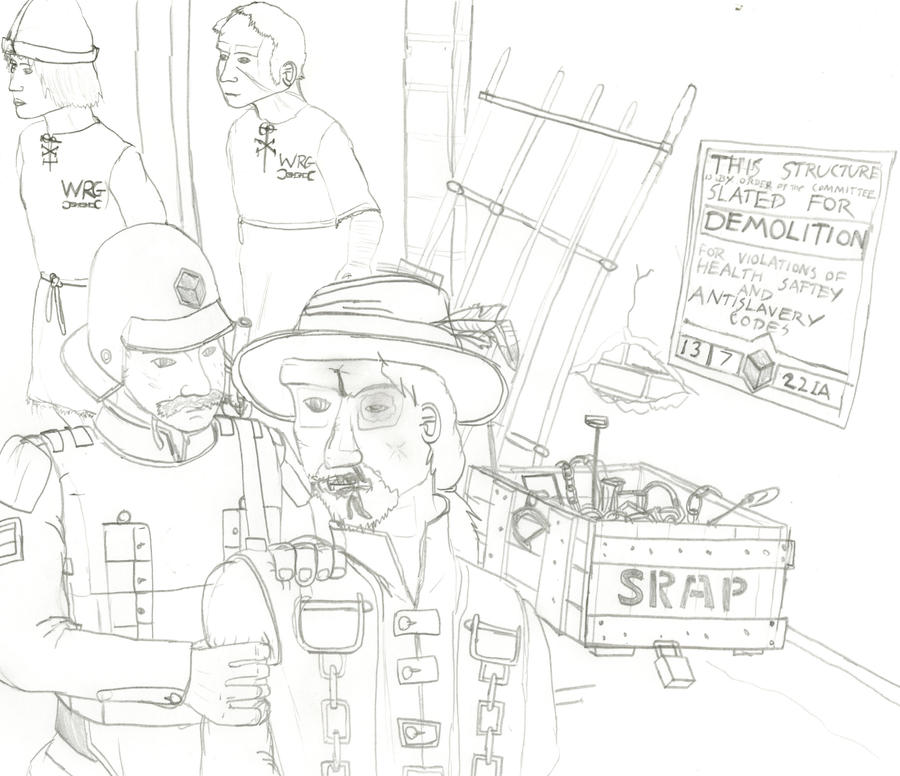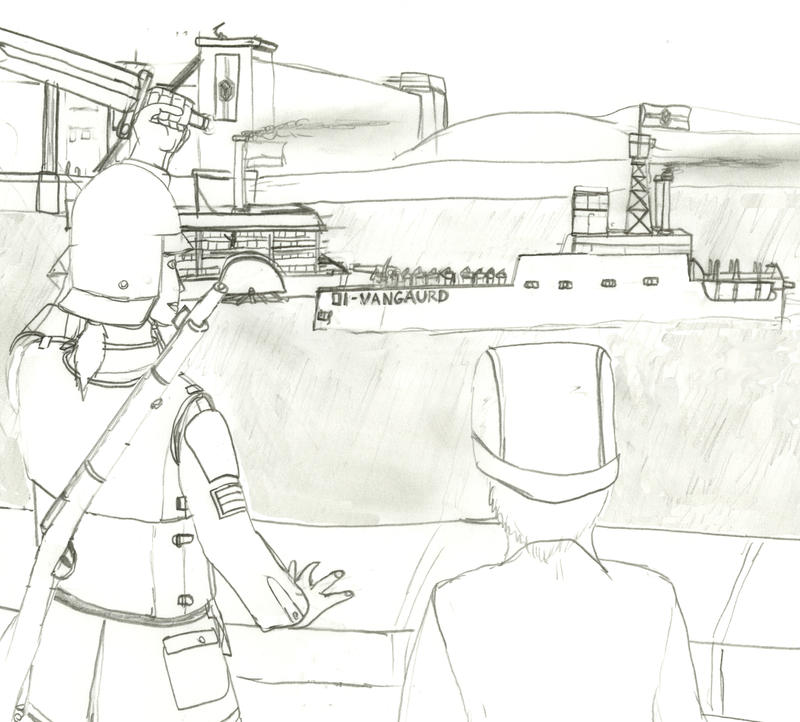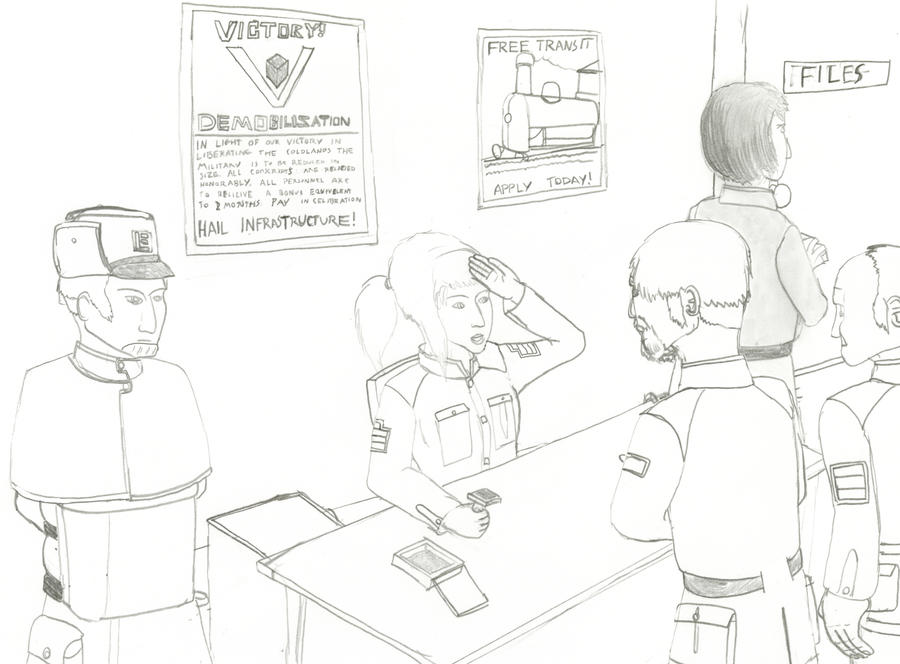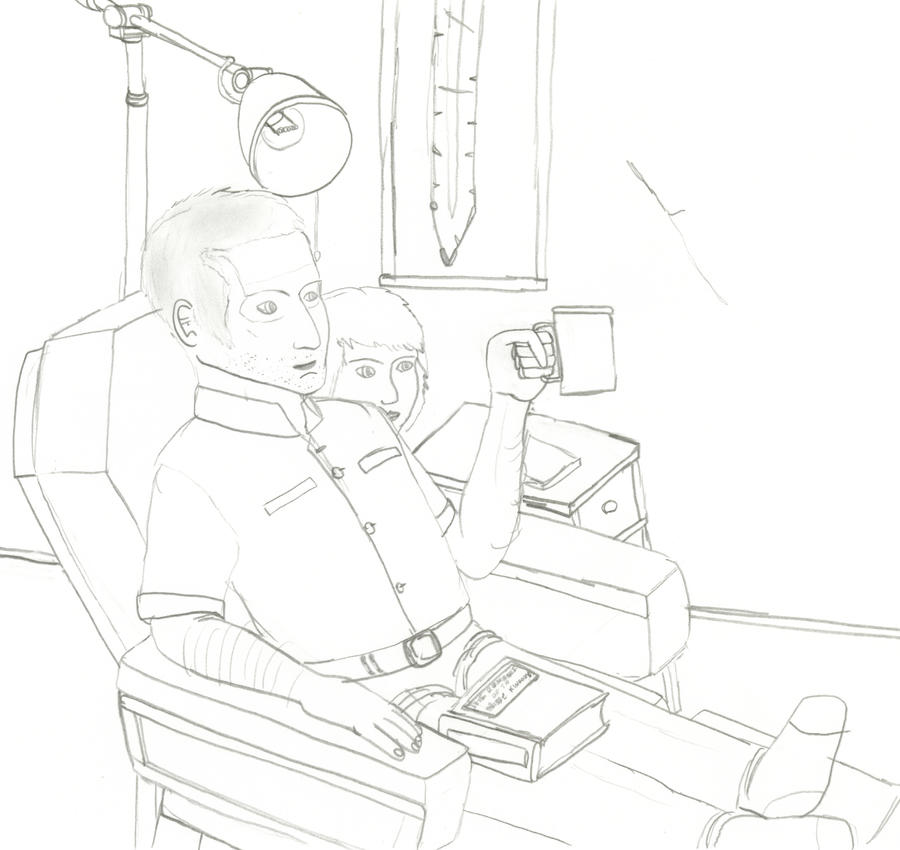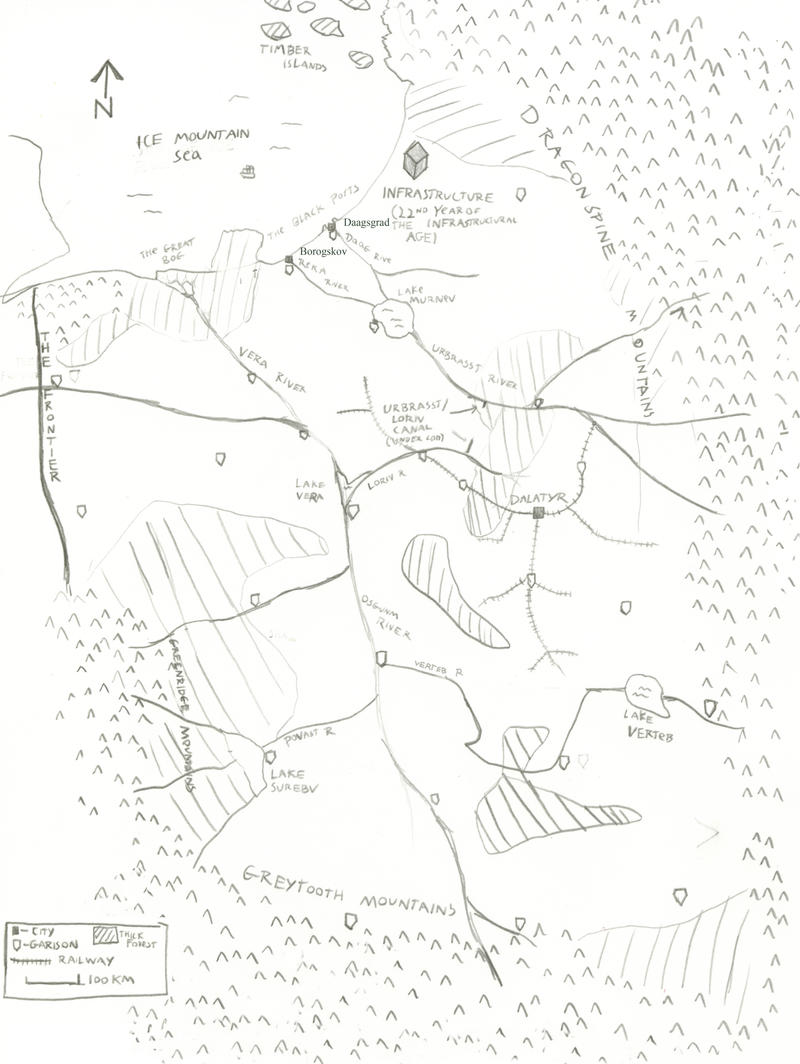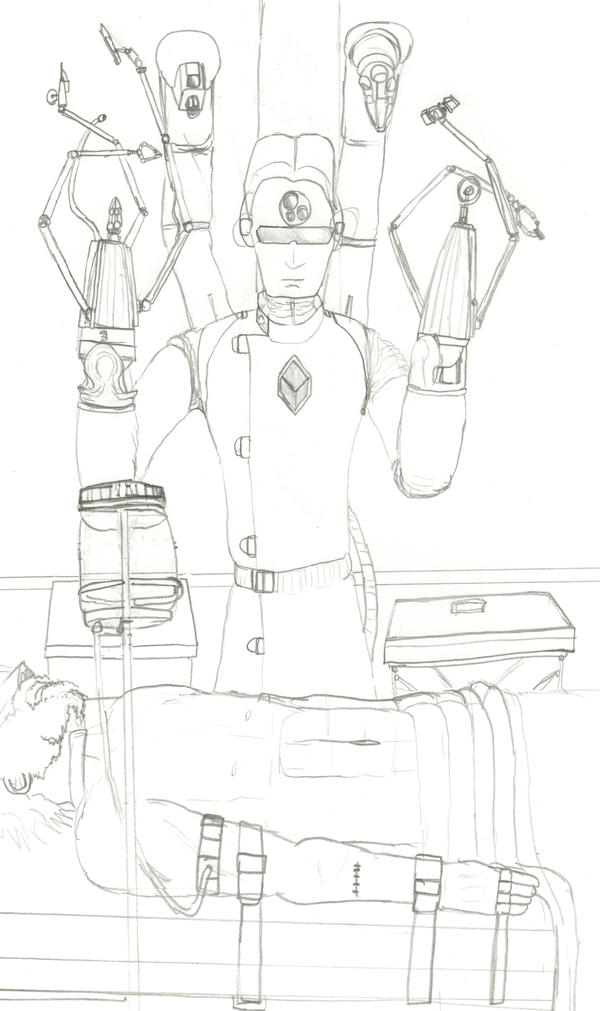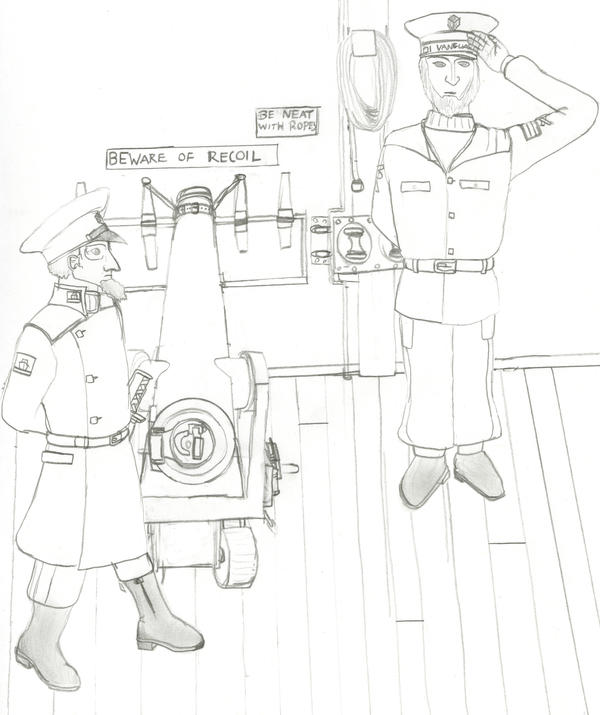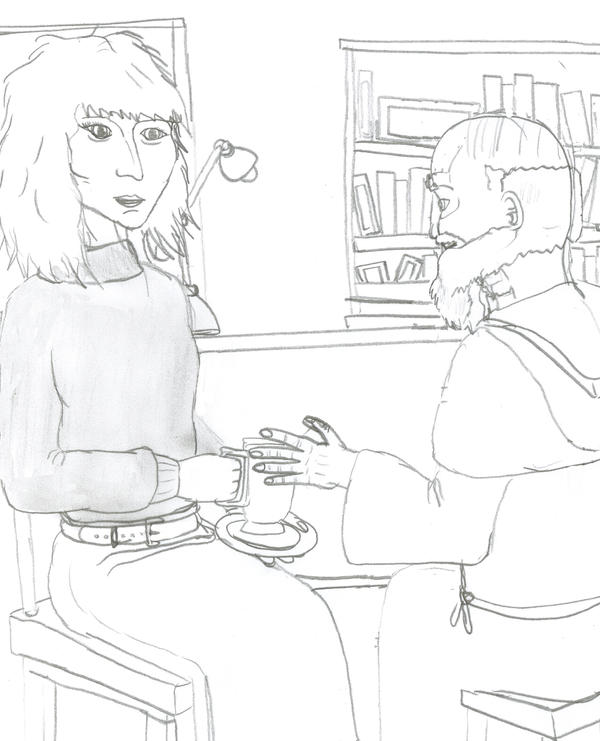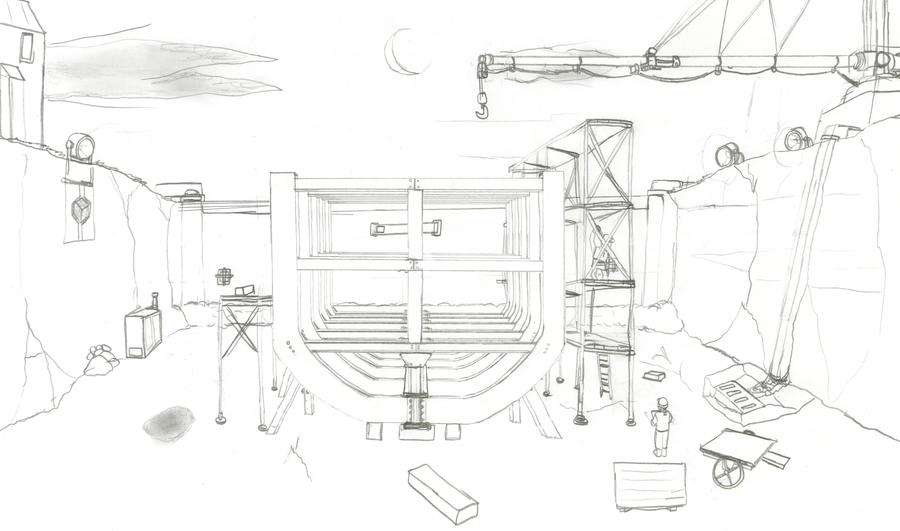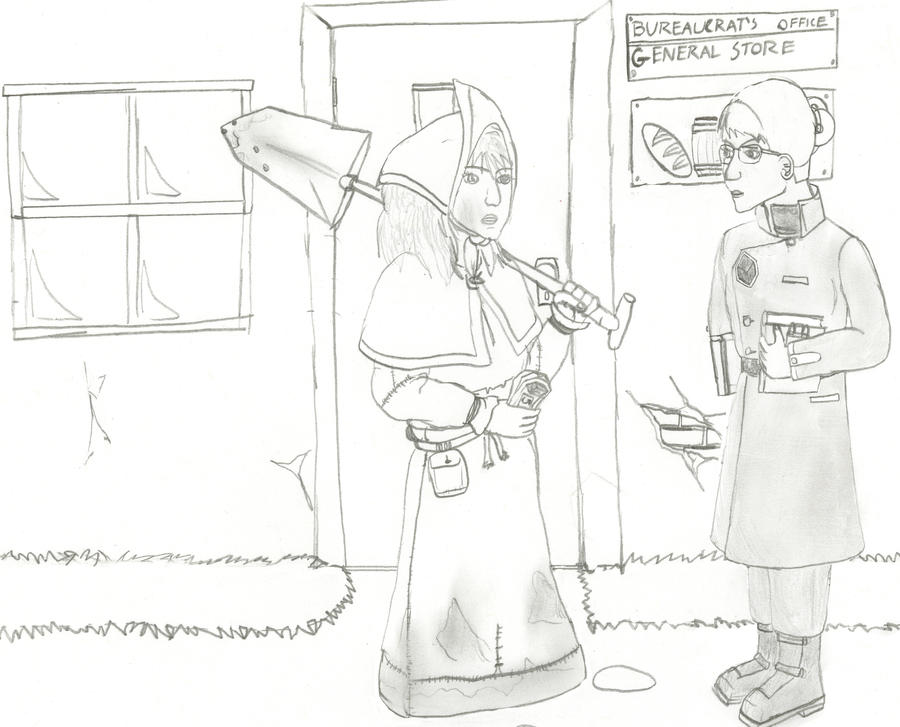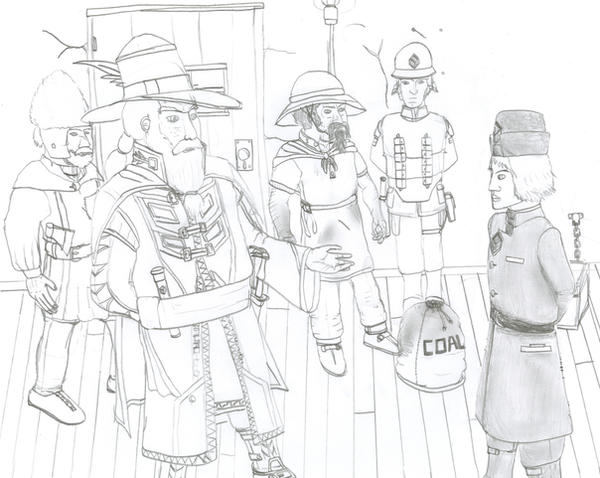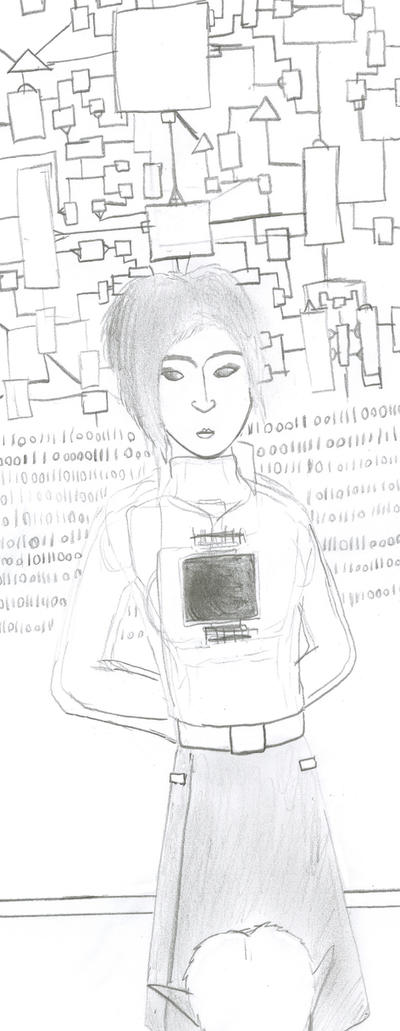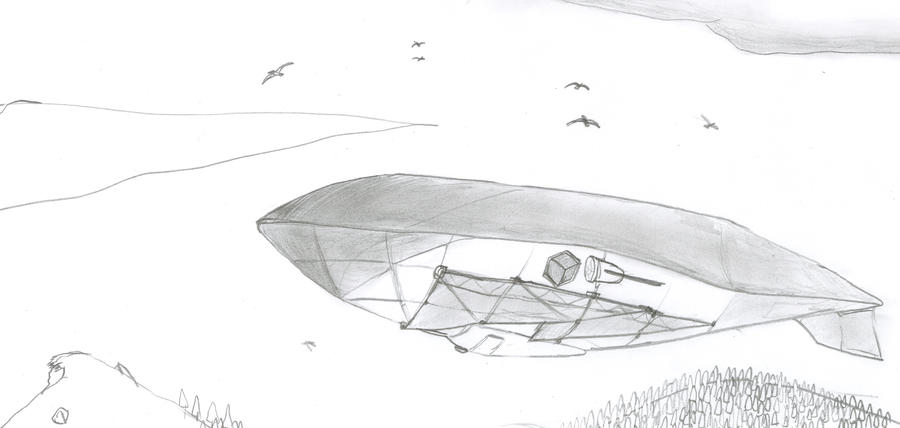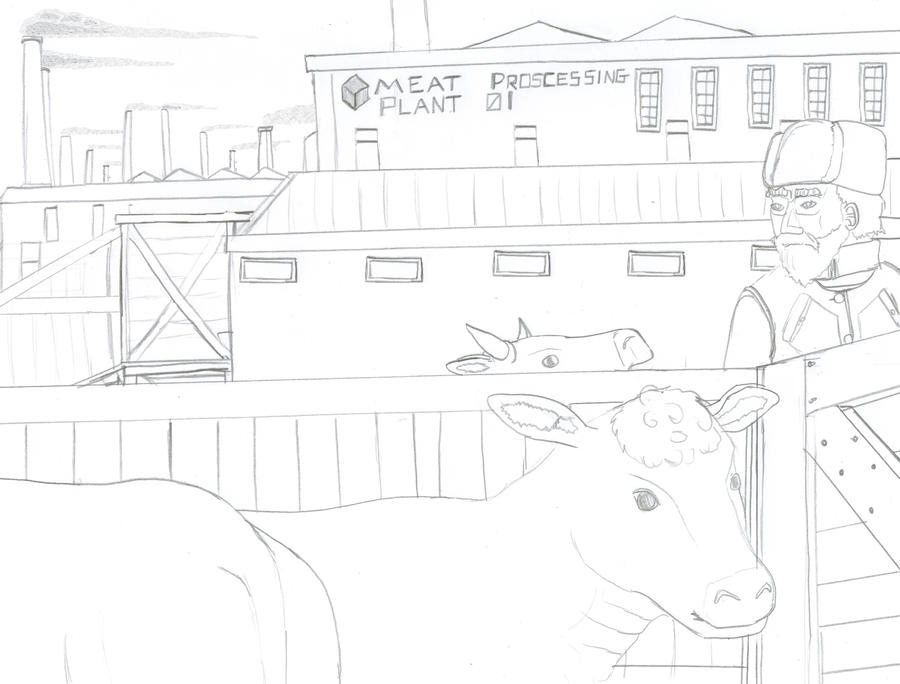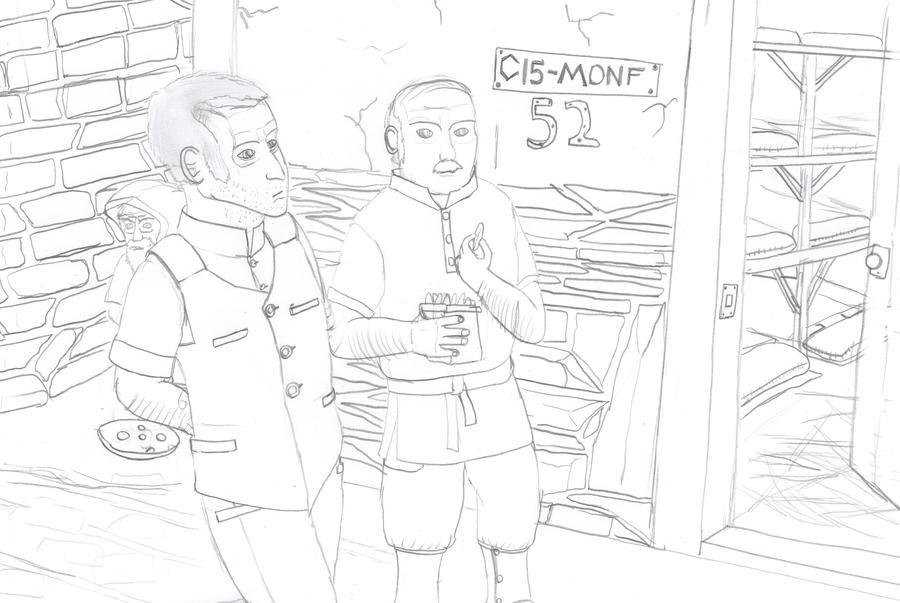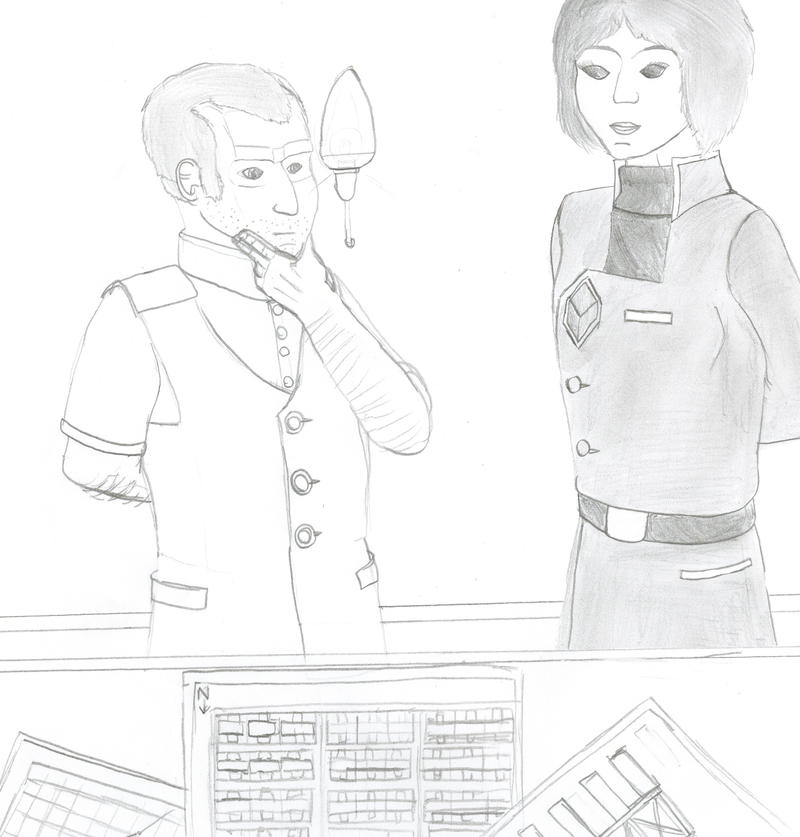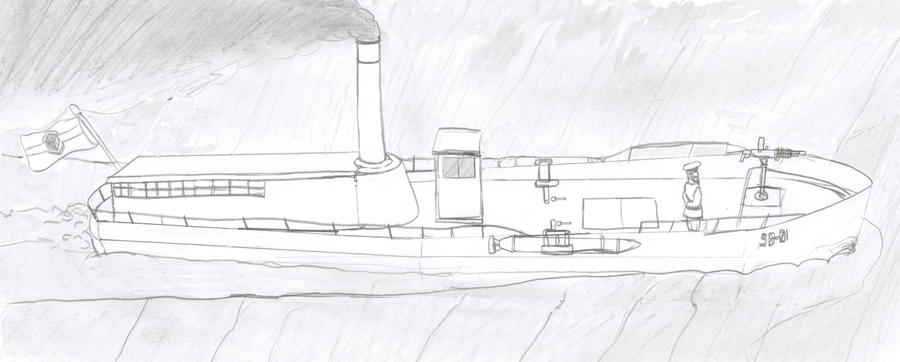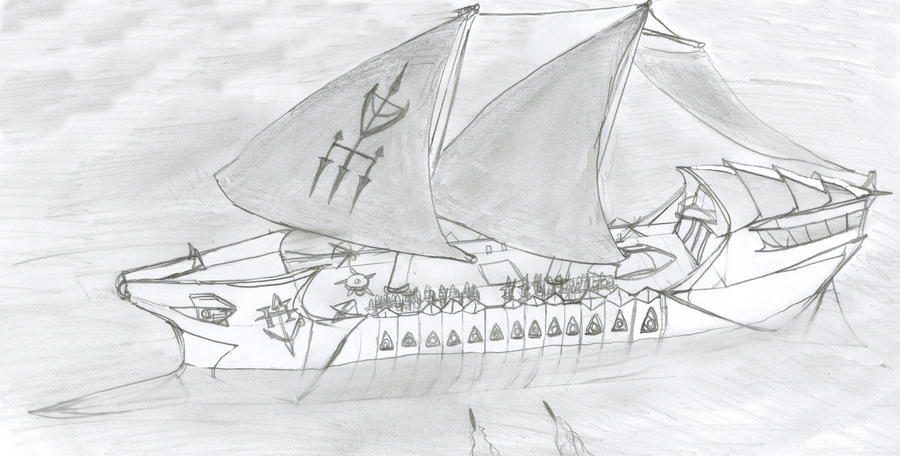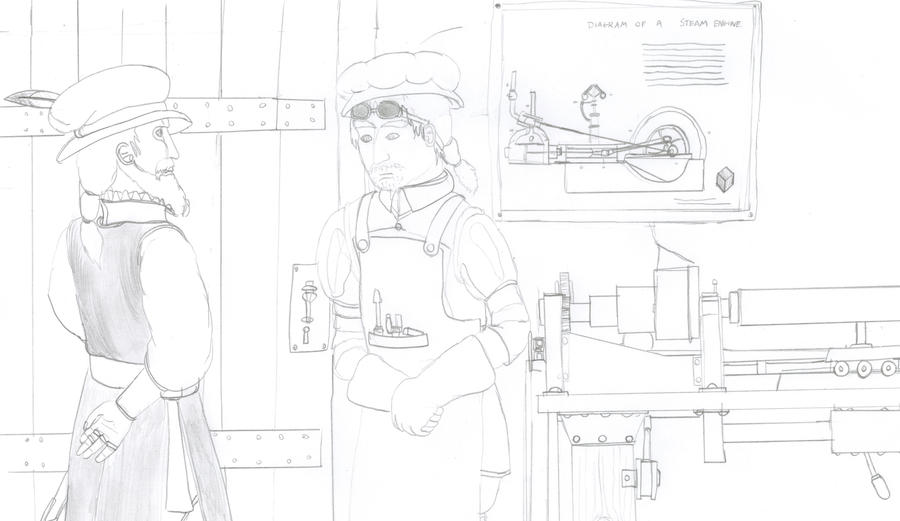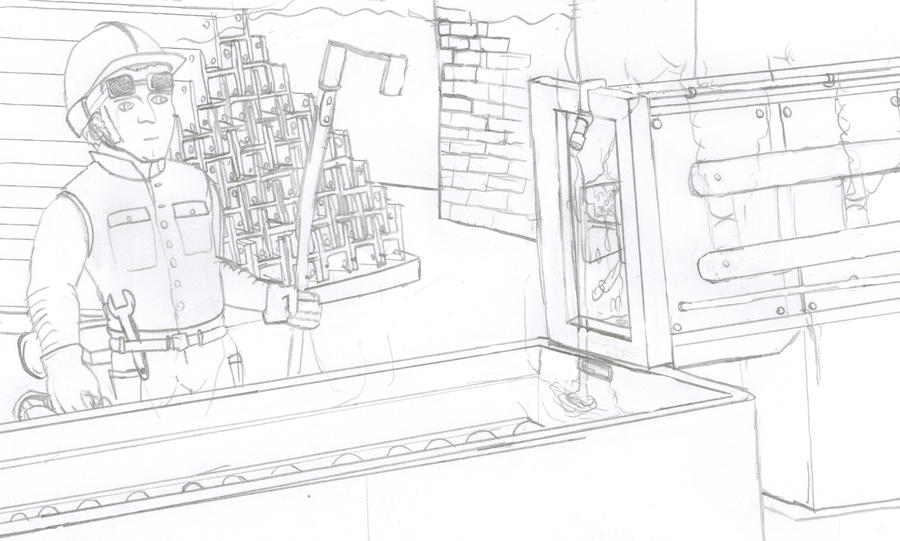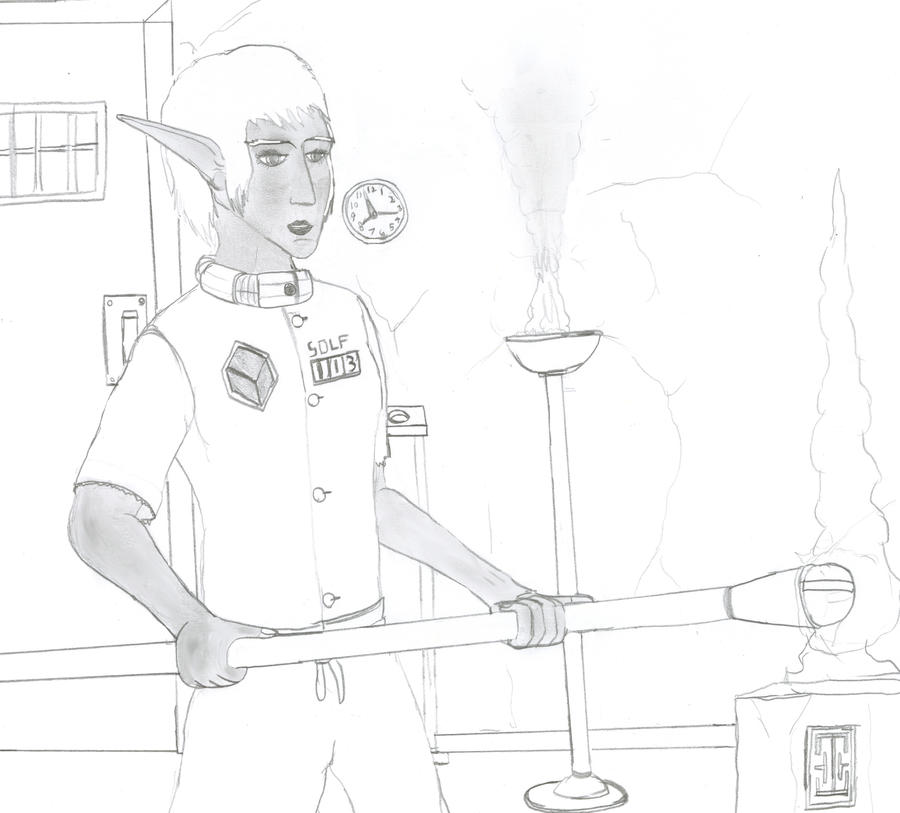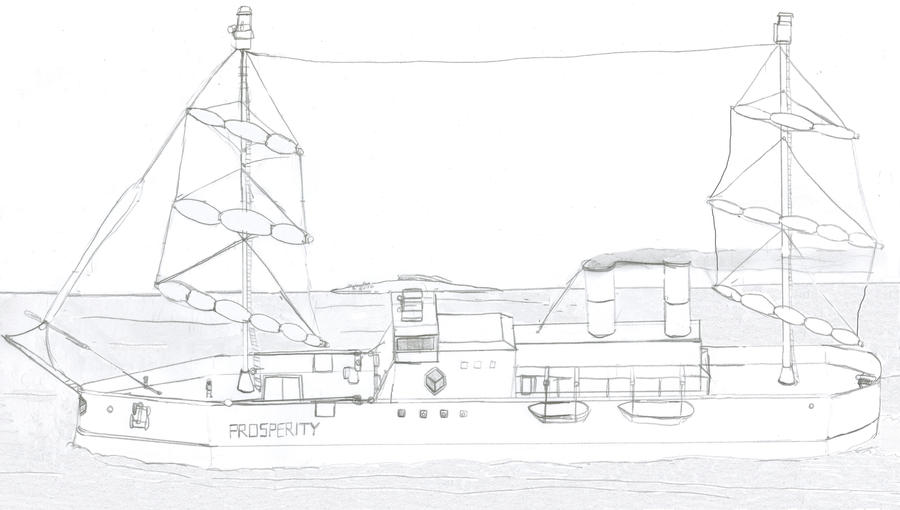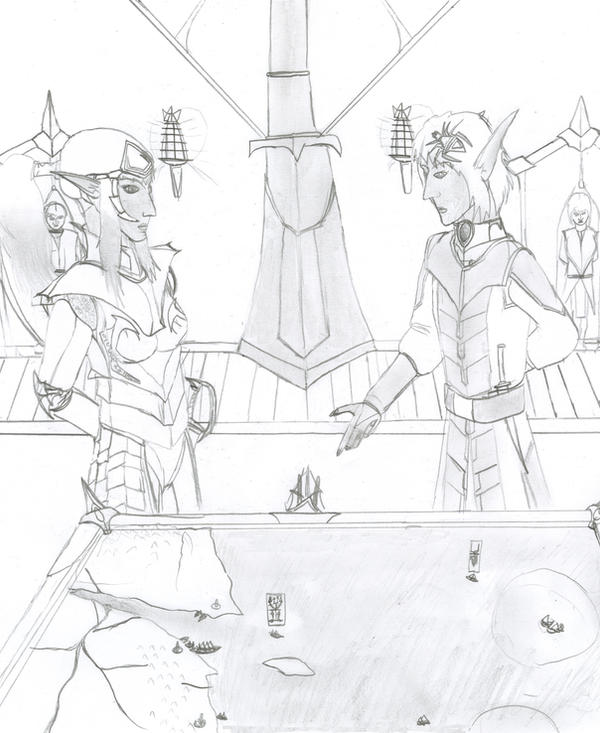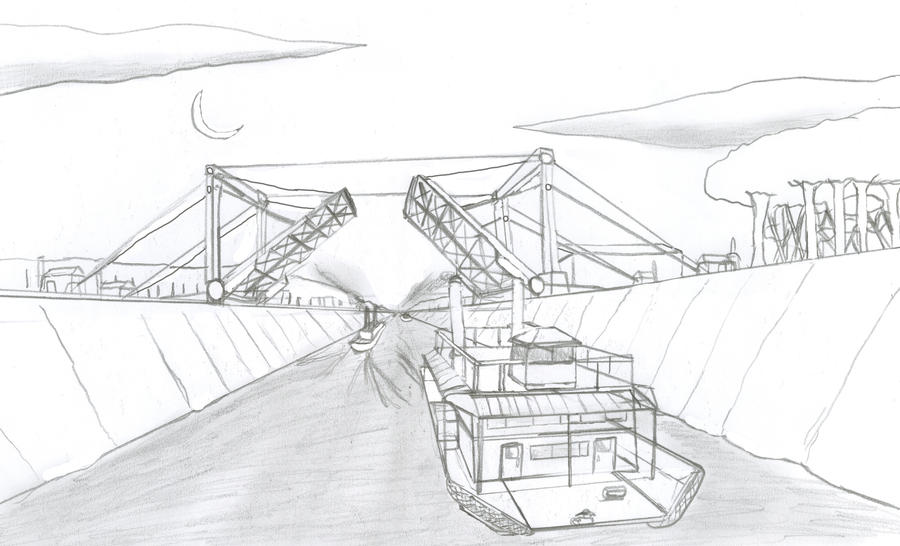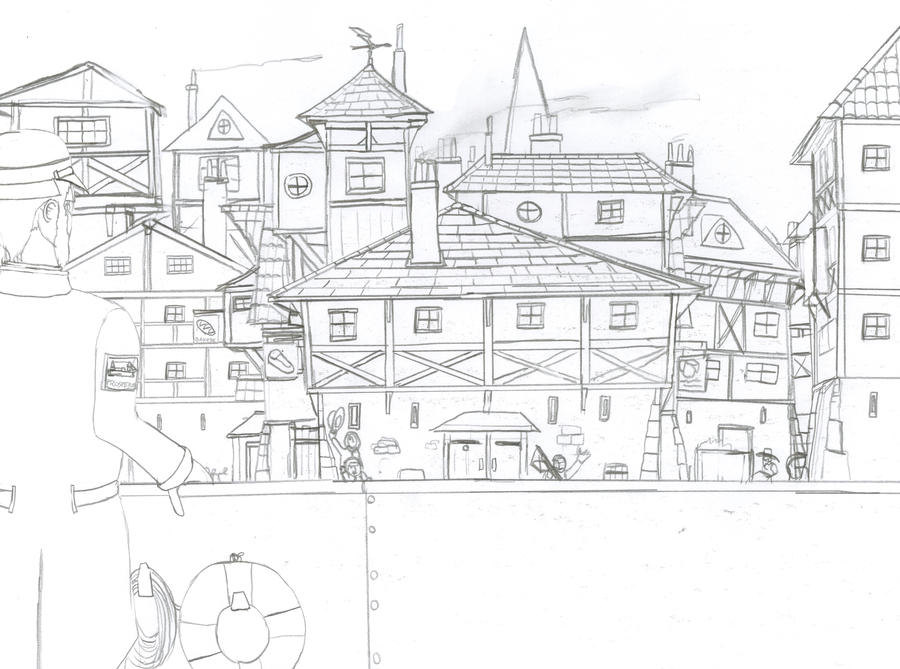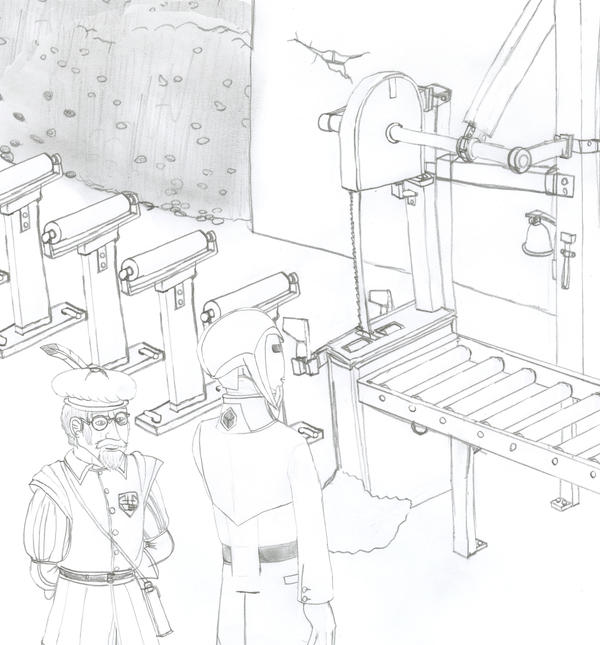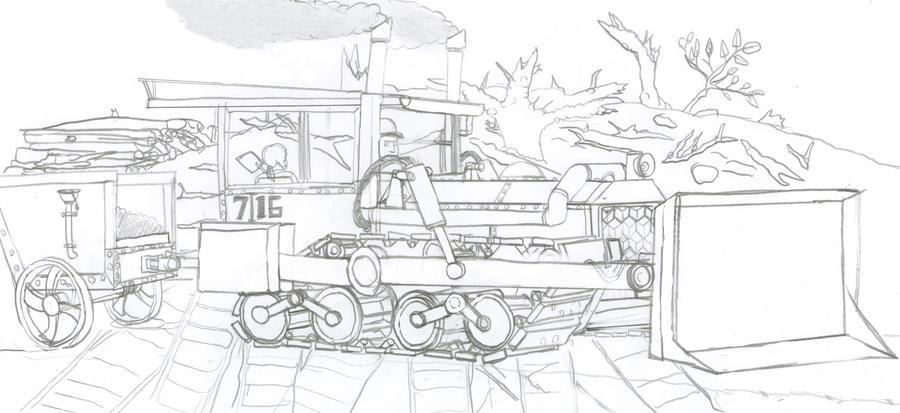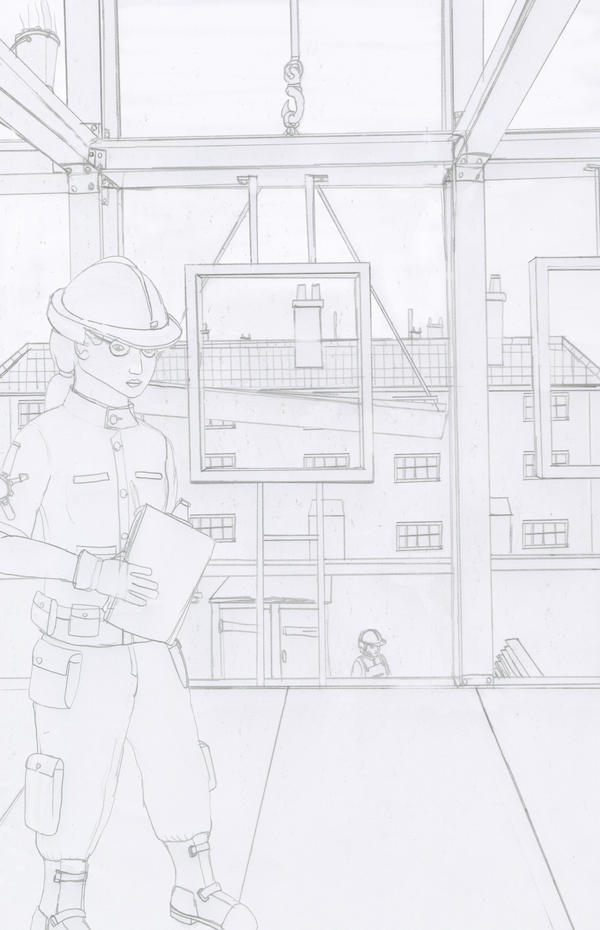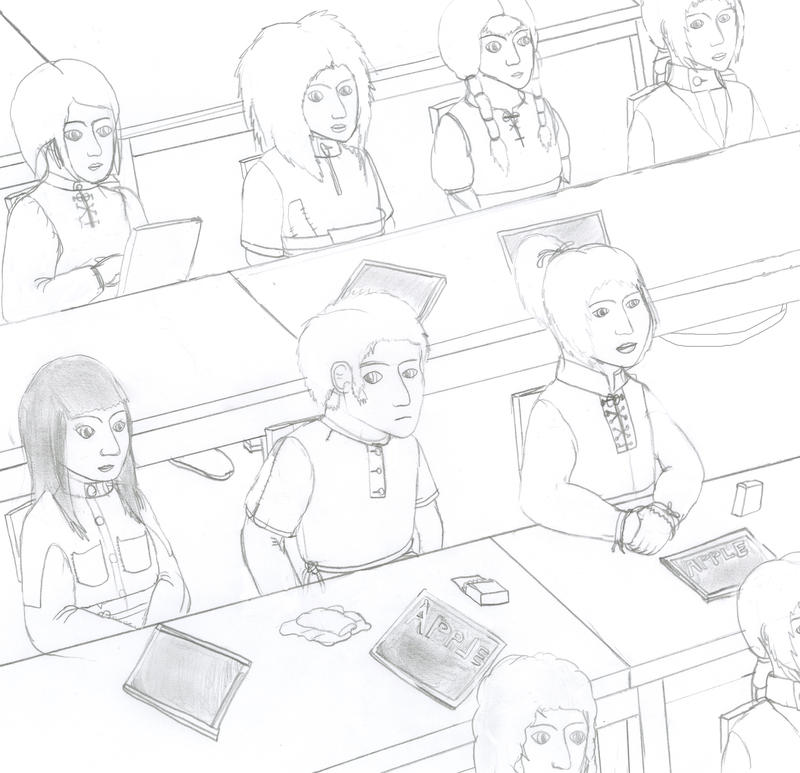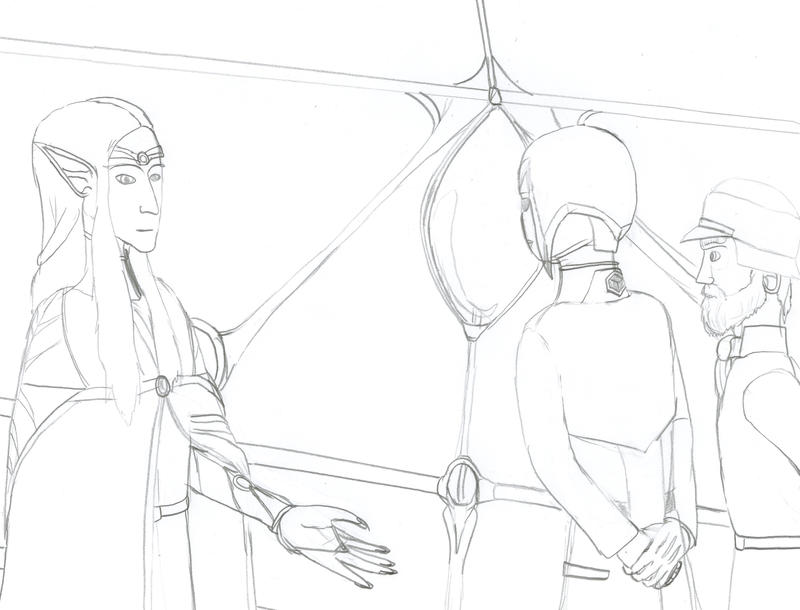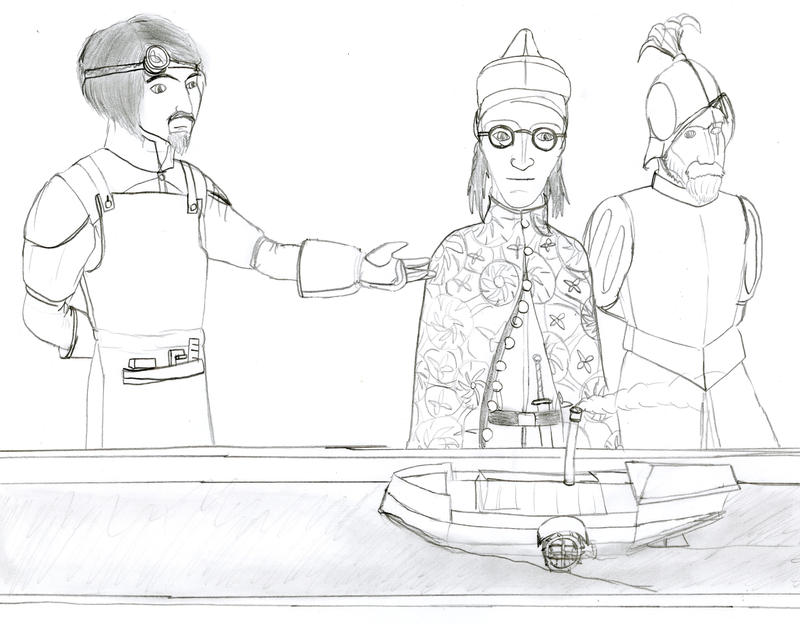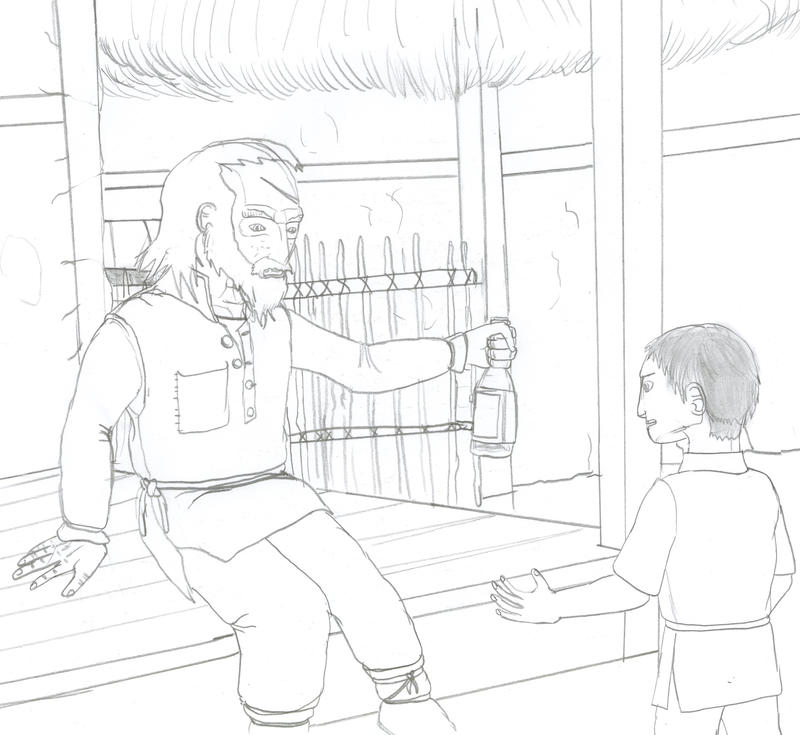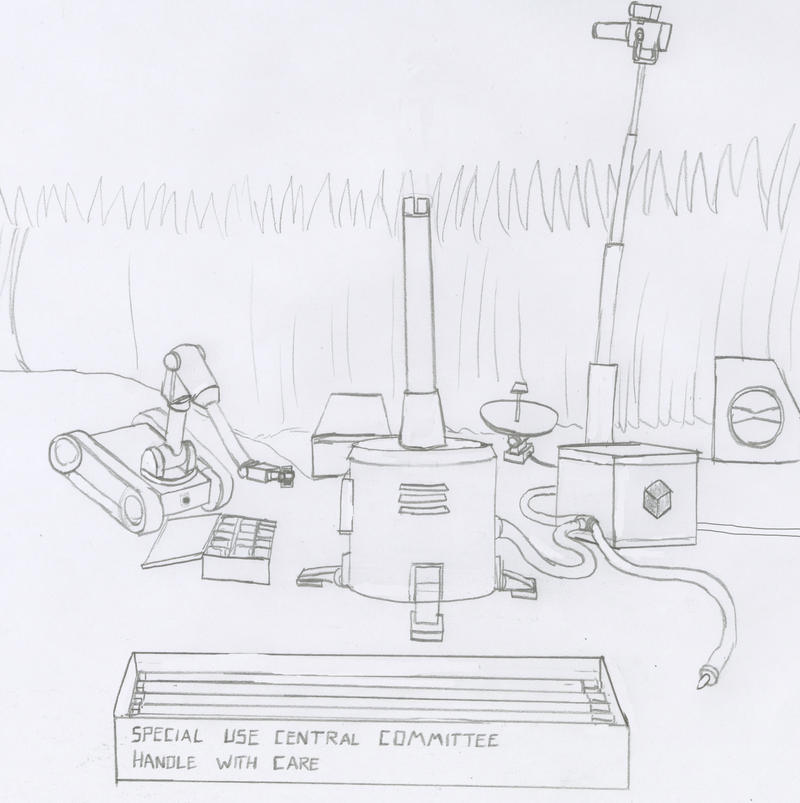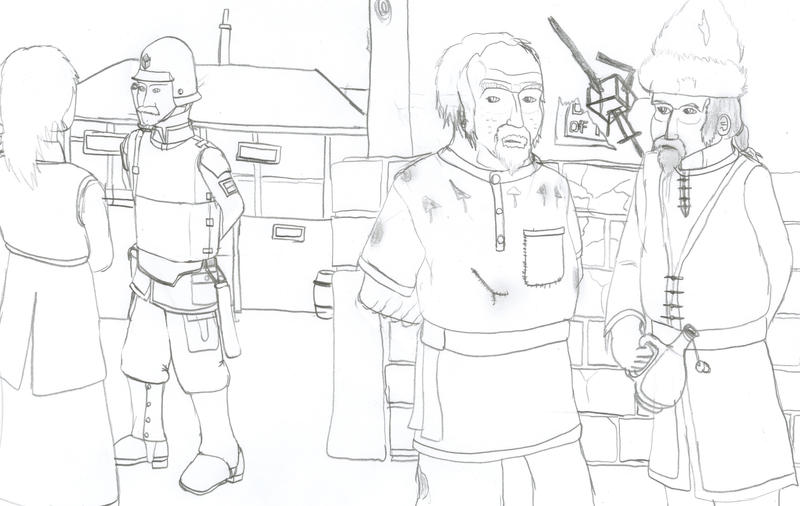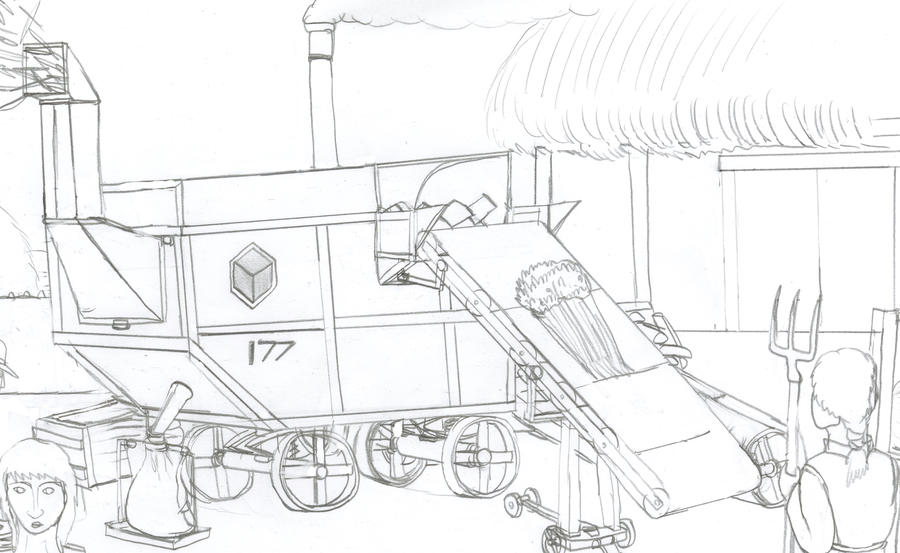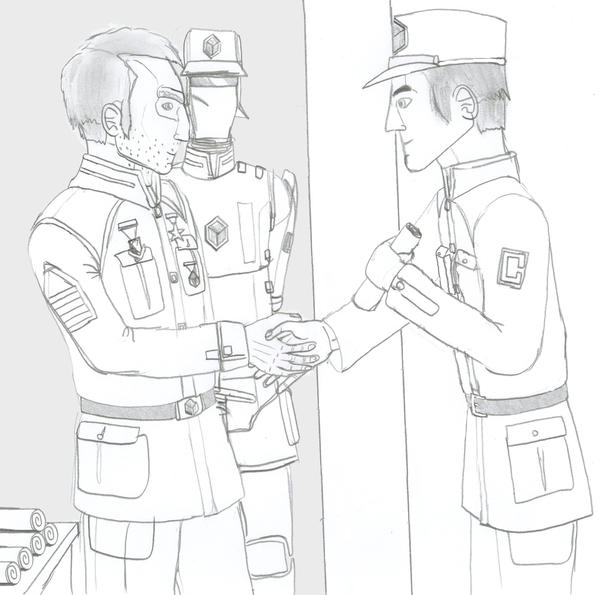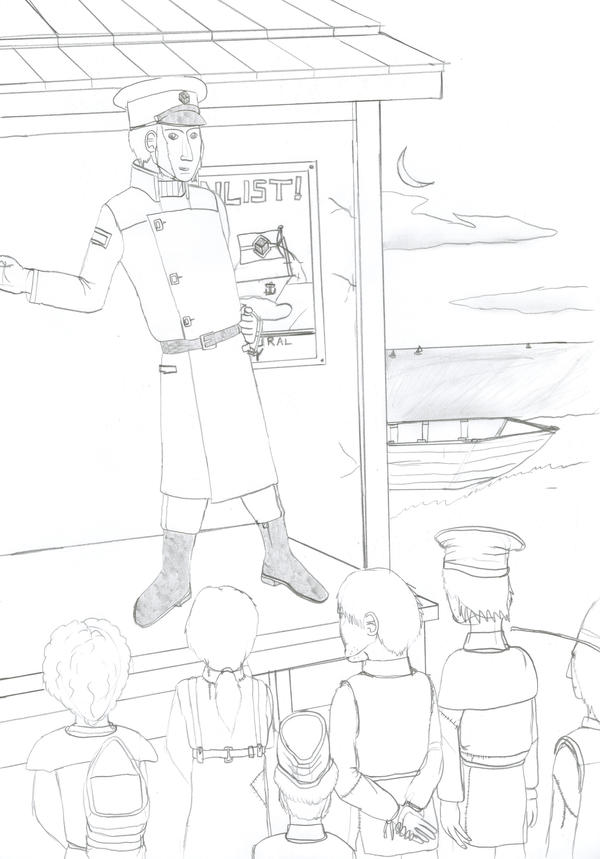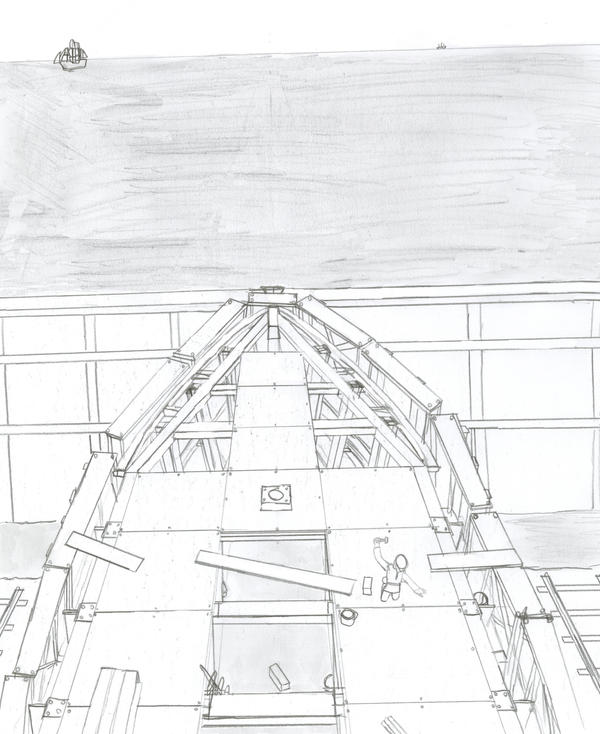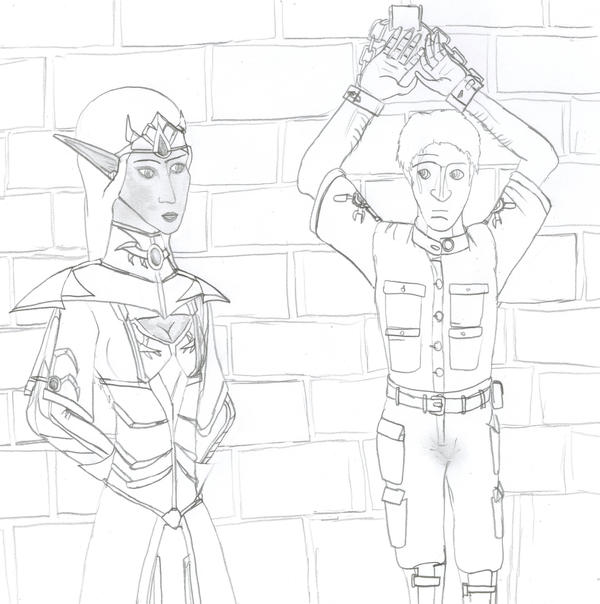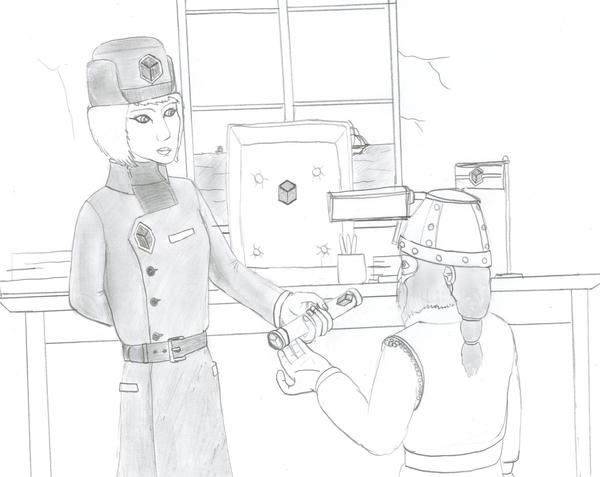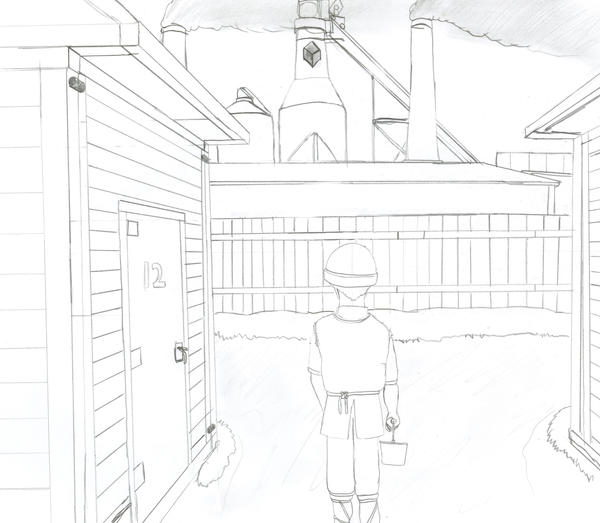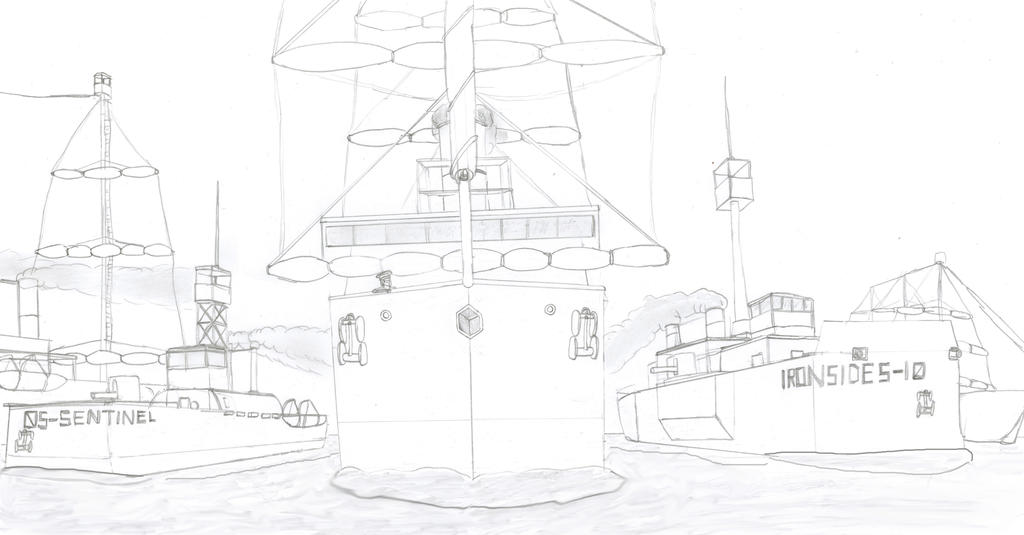By Leighton White
After a battle, a damaged spacecraft entered hyperspace. It was a risky move, but it was the prospect of uncertain death verses one of certainty on the matter. Then the worse came to worse. An event happened that shall be called, to spare seventy paragraphs of complex physics, a collapse which violently threw the ship out of hyperspace and into realspace, though not in the dimension from which it originated. It's crew managed to make it out in one piece, but the ship was still irreparably damaged and an explosion. What survivors of its crew gathered what they could from the stores and made their way onto the Lander. Twenty six managed to escape at the last moment, making their way to a nearby world. Some strange energy readings passed their sensors, but were ignored, they were not of concern. It was the only planet in range with an oxygen atmosphere, which their synthesizers required to produce plastics with their limited gear.
They crashed into the woods in a northern temperate zone. Their small craft burning through the sky, not being in optimum conditions. They crashed into a forest before coming to rest. Its few occupants then waited for their craft to cool. They then emerged cautiously, taking in their new home for the time being. Around them, birds and a few rodents saw the strange new arrivals. They were like nothing this world had seen before. They had eight limbs, sprouting from two identical mounts on either side. Each one long and flexible and ending in one of several interchangeable metal hands. Some of these had eyes and other sensory devices that took in the surrounding environment. Others had hands, one main outer one and a retractable tweezerlike inner model. Others had an unidentified box like construct that fed into cylinders that they carried on a mount. End to end, these mechanical octopiodal beings measured about four feet in length. However, these were ultimately to the effect of what a pair of shoes is to a man, if much more capable in activity. What ultimately constituted these beings were the black cubes at the center. Inside these black cases was a mind, one unlike anything this world had seen before. One that was calm, quiet, calculating, fundamentally mathematical and effectively immortal with an understanding of the nature of the universe that was unfathomably in excess of those of even the wisest of the greatest species the native beings that called this planet home.
But never the less their bodies here were quite feeble, these were designed to work in zero gravity. At the bottom of gravity well, they crawled awkwardly stumbling, arms writing like snakes and flailing for balance. Some of them use sticks and pieces of broken metal as canes as software was hastily written to let them move. Some supplies were unloaded. It was not much that they had, but it would be a start. However, they were careful, because from what they saw from orbit as they came in.
Then a rustling happened in the trees and they saw what they feared. Armed natives came running at them. They touched down in an area away from the major population centers of this world, but a few natives still existed and among them were a few bandits that lived in a land without law. A band of said bandits saw the falling star and came in to investigate, hoping to mug anyone who was also attracted by the fall. They saw the crew as they made their early efforts and something drove one of them to charge. Maybe he thought they might have something of value, maybe he wanted to sell one of these strange things from the sky to some wealthy nobleman, maybe he was just frightened. But it was ultimately irrelevant. As he charged screaming a welding laser set to full power cut right through him, bringing him down.
The rest, roused by the death of their comrade charged. In total there was fifteen of them, clad in dirty ragged clothes and a few scraps of armor and armed with maces, clubs, daggers, pilfered hatchets and hammers and a single sword. They rushed, screaming and brandished to smash these strange beings. But they too were to be cut down by these invisible lances of burning light. Stumbling and vulnerable as the new arrivals were, they easily repulsed a gang who had terrorized the countryside for a decade and had ended the lives of over a hundred people, many of whom resisted. But this is just the beginning of their tale on this world
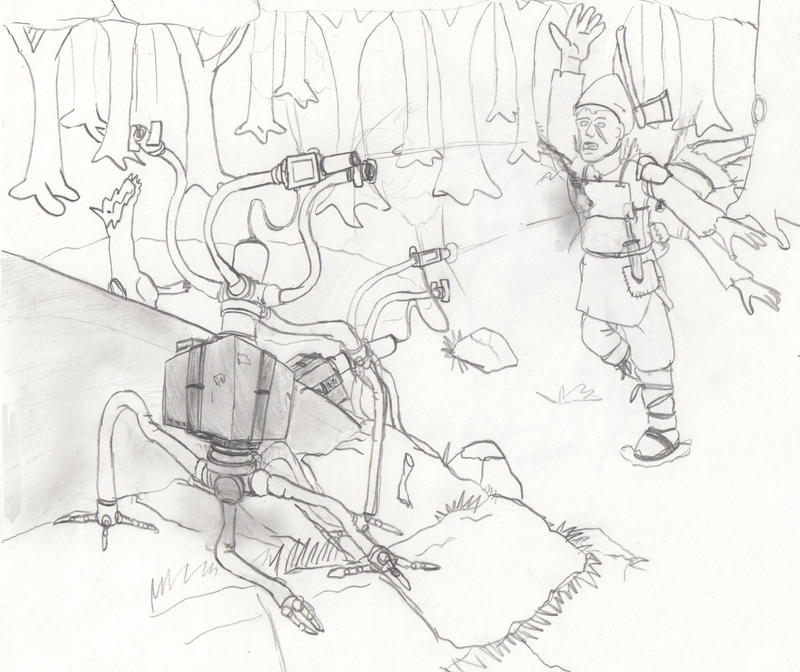
After their landing site was secure, the survivors set to work. Among the equipment they had were two general utility crawlers for work in a gravity well. These were adapted to work in the forested environment with the addition of modular chainsaws, scoops for collecting soil and log harnesses as well as general arms. They built two more over the next few months using the fabrication equipment, as well as simple disc shaped feet that, along with some programs allowed them to walk, albeit slowly with ease.
They began to establish their first base. First they set up a tent around the crashed Lander, after that they added layers of wood to offer additional protection from rain and the elements. Metal was somewhat more pressing, although a local bog and a few rocks offered up iron ore and the clay had aluminum. There were also the remains of the raiders, which yielded a few extra kilos. There was plenty of plastics. They were sparing with what they made out of metal. To secure their base, a defensive wall was set up, starting with a fence of branches, then reinforced with logs and clay, enclosing an area about twenty meters across, as well as sentry towers with cameras and laser welders.
Progress was somewhat slow, but continued without too much interruption. The survivors worked day and night, sleepless and indefatigable, only pausing because of rare accident or to recharge. Some wildlife passed by, but they had little interest. What was concern were a few of the native humans which came their way. The first ones that attacked on the landing day were examined, their bodies disassembled and their components cataloged. After a few months, a second group of bandits attacked, and were neutralized as the first ones were. Though some of these were shot in the legs and captured alive. With some experimentation on these individuals in motivation (such as the fact that they avoided pain, enjoyed eating and had a fear of death) could be used to manipulate them. Using electroshock collars with tracking systems, a camera and a knife that would slash the jugular they managed to turn these humans into laborers who could assist them. This number would increase as more would come in close and be captured. Eventually, fifteen poor sods came to call this place home weather they liked it or not. Rumors spread among the natives of a powerful wizard's cottage, or monsters. However, as they kept to themselves (outside some airborne recon, which went unnoticed in any case) and the scouts that the local chieftains sent out tended to not come back, they were left to their own devices.
This state of affairs would continue for about two years. Originally the machines planned on building up manufacturing machinery, but there were setbacks, a few breakdowns and that was not an option. They could maintain themselves and build a few items of machinery but they could not replicate their fabrication equipment. All in all, their estimates pointed to a process that would last thirty six hundred years to replicate what they had on their own, possibly longer. This was if they were not destroyed first. This was leaving aside the fact that the area they had lacked certain elements that would be vital and that their reactor would not be working in twelve years' time. Other options were considered, and one was seen as the most viable. The natives while primitive, could be of some considerable use. A plan was made and effected.
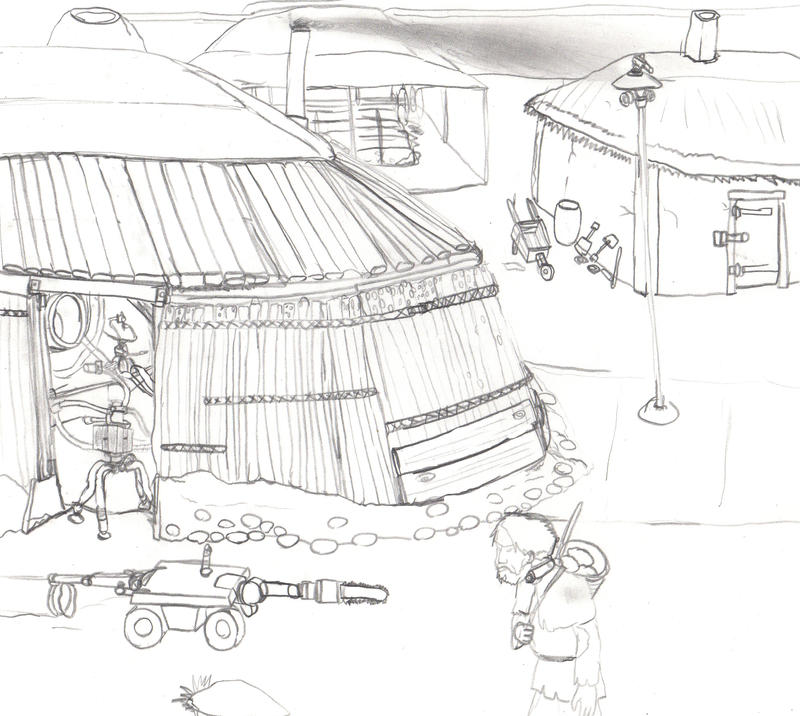
Using small airborne probes, they scouted the surrounding area. The land they crashed into was quite cold, with long winters. It was possible for the native sapients (of which several species were identified) to lay down crops in this area, though agriculture was difficult. In more distant and temperate areas longer range recon flights had detected more sophisticated societies (if still primitive), but here their was a number of small iron age villages scattered among the hills, forests and stretches of grassland. The natives called this place Ronlatev, or more commonly just the Coldlands.
These villages were small, the largest of these had a population of maybe three thousand, and most were much smaller. The buildings of these towns were simple, crude wattle and daub buildings with a stone structure in the center of the larger ones. It was also apparent that there was no central order. All but the smallest clusters of houses that could be dignified with the title of hamlet had some form of fortification and numerous small scale battles and raids were observed. Some of the combatants (either the leaders of these villages or high ranking people in it) fought were mounted on the backs of quadrupedal herbivores, most fought on foot armed with swords, axes, maces, spears, bows, javelins, the occasional crossbow and other such primitive weapons. On three occasions, flashes of electricity were detected arcing across battlefields, and on two unrelated incidents burning projectiles were unaccountably detected in similar circumstances, but the rarity of these phenomenon meant that it figured only slightly into their calculations. These warriors also fought with bandits and some anomalous semi-sapients which inhabited the forests seemed to be a splices of some kind. As was previously mentioned, a couple of their scouts were dispatched to investigate the landing site, only to be either killed or captured. A few caravans of traders were also sighted under armed escort that moved from the more developed areas to this one. This led them to believe that the more developed civilizations knew of this area, but had no interest in conquering it.
The Nature of the society here was simple to determine, a warrior elite controlled the various villages by force. They used villages to support them, occasionally dragooning a few of them into their ranks. What they said was law. To them, villages were something that existed to provide them with food, housing, equipment, drink and females in exchange for protection (in regards to killing bandits, defending them against raids from the warriors of other villages and retaliating against those who attack them) while they raided other towns for pillage, rape and occasionally to conquer. However, one warrior group could rarely gain control of more than a few villages, as many lieutenants put in charge of conquered territories could gain independence easily by starting fratricidal wars. Promotion was often achieved by backstabbing. Occasionally villages were destroyed and their population forced into banditry or slavery, and new villages arose. They generally viewed their subjects with disdain as weak cowards. Rebellions were rarely successful, generally ending in peasants being beaten into submission. As such, they often took a delight in abusing their subjects, as this high ranking warrior is doing with one of his peasants that he suspects had hidden a pig.
From what could be gathered from captives, the warrior saw this constant fighting as a source of strength. They believed that the constant wars killed off the weak, leaving the strong to thrive. The survivors saw this as a condition which could be easily exploited for their purposes.
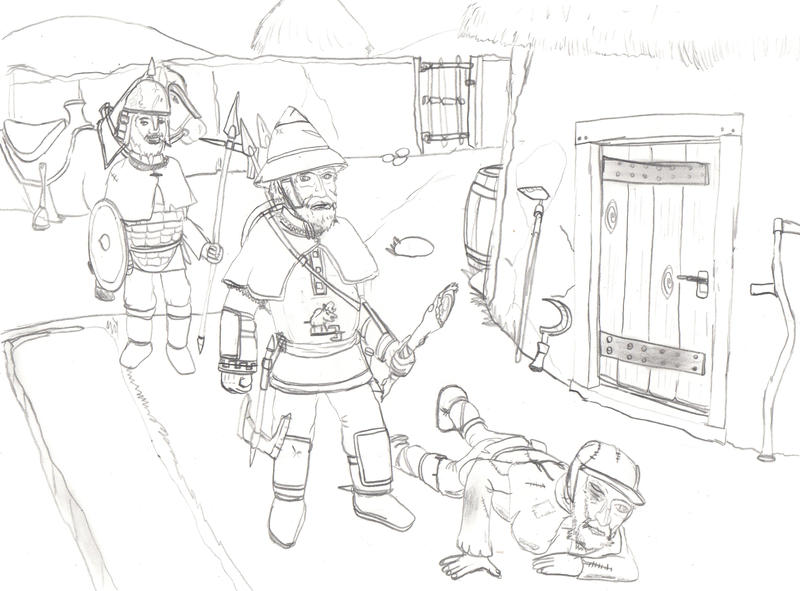
Seven months after their arrival, they began to affect their long term plan. The first phase of which involved the creation of new bodies for the task. After much discussion, a consensus was achieved on these new forms. It was determined that even with audio recreations of their language for commands; they had an easier time and were more comfortable communicating with something their same shape. In addition, having a body in such a shape also allowed them a degree of camouflage. As such, they designed and built their new bodies to roughly match those of the natives.
Using video footage and information gained from dissection of dead locals, they came to mimic their form. A prototype was conceived of and built, fine tuning the design. Even working tirelessly towards their objective and with fabrication equipment, it took twenty months to assemble their force. The finer details of the face would be left out until after the first phase had been complete. In the end, thirteen of these machines were created including the prototype. They stood two meters tall and were stronger and more durable than the organic creatures that they were designed to mimic. They also had a greater degree of flexibility. The sensor package that they had would give them a greater degree of combat awareness. Finally, each one had two lasers welders installed on its forearms. Here one nears completion, with only a few additions to its arm and some armor around its waste remaining to be installed.
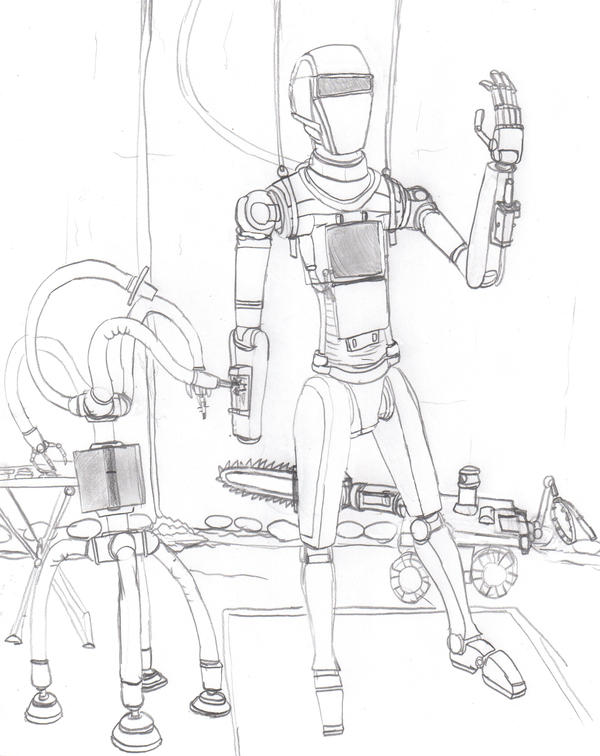
Two years and three months after landing the supplies were completed and an offensive was prepared. After some debate, a target was selected from several possible locations within thirty kilometers from their landing site. Using data acquired from Ariel recon and interrogation of their captives, they selected a village known as Dalatyr. The host of warriors that controlled it (as well as four smaller villages) were particularly cruel and abusive to their subjects. The town had superior fortifications and was located on top of a hill and a sizable coal deposit was nearby. Finally, it's leaders decision to launch a force of fourty eight men, half his warriors and all of his cavalry on a long series of raids against a rival. That sealed the deal, and with that they moved out.
To allow them to approach unnoticed, they had created a set of garments to hide themselves, heavy robes with hoods as well as face coverings. Half went on the journey while half remained to hold down their fort. This allowed them to carry a wooden wagon without much comment, which contained some supplies. The disguise was an effective one, a small group of bandits attempted to jump them, but were quickly dispatched. Two killed, one was taken as a captive. When they were with a kilometer of Dalatyr, they passed four men on patrol outside. Warriors rarely attacked merchants as their trade provided them with small luxuries and occasionally fine weapons and armor as well as allowing gaining a few gold pieces selling captives as slaves. Attack one and it was likely that word would get around and the others would avoid your one like the plague. Their captive only served to dissuade their interest even more.
They reached the gate without incident, paid the gateman with a few coins they had accumulated and salvaged were handed over the village opened up to these innocent traders. Then, after the gate was open, they struck. The gate guard was picked up in a movement, causing him to drop his blade and be subjected to a laser pulse. The others outside fired at a group of sentries manning the walls and a crude guard tower. A group of archers and crossbowmen that were drinking in a tavern positioned near the gate responded with a salvo of arrows and screams to bring in backup. However, their crude projectiles bounced off the machine who returned fire.
With the sentries dispatched and the gate left open, the other twenty robots rushed through the breech. The various civilians of the town retreated to their homes and barred their doors, in search of safety against these attackers. Warriors took up their weapons and began to converge on the origin of the screaming. This activity was observed and monitored by the airborne drone.
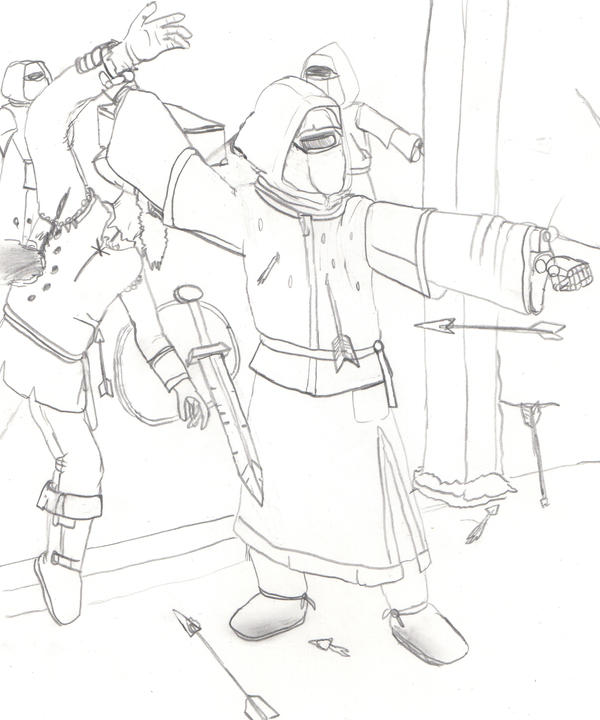
The humanoid machines pressed on through the Dalatyr. Two guarded the supplies in the wagon while the rest broke into three groups. Two of said groups moved through the winding streets passed the long houses and lesser hovels that made up this town of about seven hundred souls. They hunted down what warriors that mustered to resist the attackers. They were unprepared and many had little time to prepare and no co-ordination to their efforts. They had no idea what they were facing, but they went in, the rule was simple. Any invaders inside the wall must be killed, captured or repulsed. To strengthen themselves, they roused a few young men to join them in defense. Even after those who defended the gate were struck down, the defending warriors and associates had a numeric advantage of five to one against the invaders, but they could not match them. They were dispatched, though some were simply shot in the leg or had their arms broken.
The majority of the population stayed locked in their homes behind barred doors. This was easier to defend and they knew that armed and armored men could kill those armed with hand tools without training in war nine times out of ten. They also had experienced the changing of the guard of leadership before. This lot only moved in thirty years ago after killing the previous reigning lot of sword swinging ruffians. There was little point in killing off your new subjects. However, they heard a strange Corus, repeated over and over again, loud and clear...
"Stand down and remain calm. If you are armed, drop your weapons. Do not resist. Those who do not oppose us shall be left unharmed."
This was not how control was ceased. Homes would be raided, supplies would be stolen and young women were left at the mercy of men too whom the idea of "consent" was not an immediate concern. A few of them saw what was done and that convinced most of the others to take their word on this.
The other group, which had five combatants in it charged directly for the central hall. Similar to the longhouses the rest of the population inhabited, but with two wings built on the sides and made of stone. A few warriors and some people retreated into it and barred the doors. The warlord who lorded over this small kingdom sat there, a grizzled battle worn veteran named Heisenoff. A man who had led charges, won numerous battles, killed dozens of enemies and had risen by skill in battle, boastful tales, bloody reputation and several notable victories had earned him the position of respect among the warriors and their willingness to call him leader. To his subjects, his rule was one of fear. Do as this man said or at best, you would get a beating. Many of his subjects had things that reminded them of their past failures with him, either in a certain asymmetry in regards to their feet or the shadows of pain that returned at the touch of a cold wind.
The eastern doors were then forced open suddenly by an explosive charge. The remaining civilians ran out the far door, fearing what would come next. Heisenoff had been prepared for this, and had in hand his sword. When the invaders entered he and a force of twelve warriors made their stand.
The remaining people searched for shelter. Their neighbors having barred themselves into their homes, they hid in barns, outhouses and sheds and behind barrels. Eventually, a few noted that on the northern door of the great hall was open with two of the invaders flanking it. They stood aloof and still, like guards. Slowly a few of them gathered around the rough empty area around the base. They monitored them, and they saw what they could do. Once a small crowd was gathered, a chest was found and tossed in front of them. It contained a load of copper and silver coins, one of a few that the warriors accumulated over the years. Then from out of the gloom of the building came a third invader. These beings did have names, if ones that were rather award to say, this one was designated as (Roughly) Unyielding Drive for Excellence Even when Under the Harshest of Pressures-45815 (heretofore to be referred to as Drive). In its hands was the severed Head of Heisenoff, which it held out for all to see. There was mixed feelings among thetowsnfolk who bore witness to this. Tashia, the wife of Arleg the Carpenter was shocked that now the man who, whatever else he did, had kept her town safe. Boris the Blacksmith was more than happy to see him put to an end, having lost a leg in punishment for protecting his daughter from the assertive advances of several of Heisenoff's men.
After five seconds, Drive spoke, confirming what all the townspeople who saw the severed head of their "Protector" suspected. "We are now in control of this settlement."
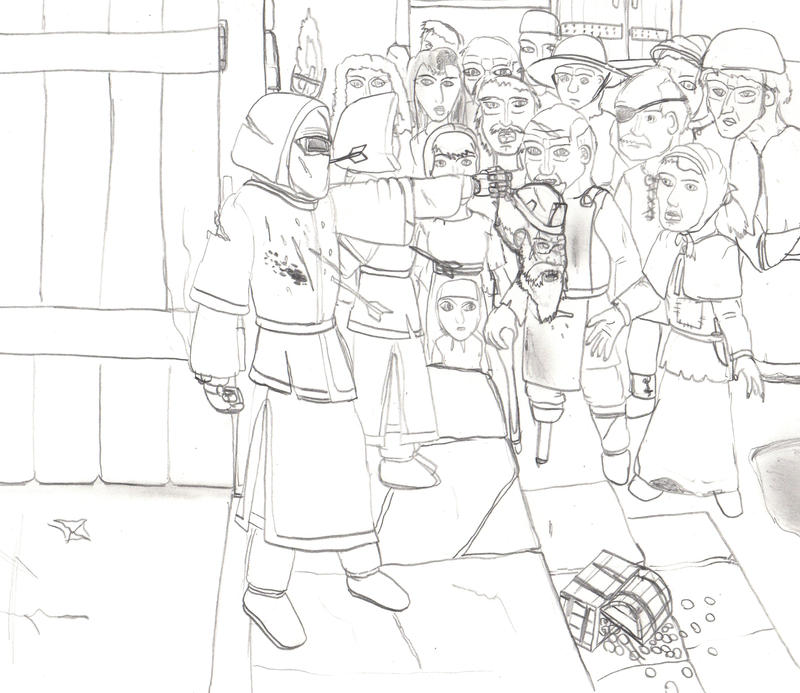
After the defeat of their former lord, the people of Dalatyr wondered what would come next. While more than a fair share of them who were glad to know that Heisenoff and his gang of ruffians had been put to an end, they also had no idea what was in store. A few tried to flee through the fort's two gates, but found that they were now guarded. Most however were not willing to abandon what they had for a life of banditry and stay inside. Tension was relieved as the coins were collected without interference. Curious of the lack of pounding on doors, more and more left their homes to see what was going on. The small crowd at the doors of the great hall increased in size. They also noticed as the cart was pushed towards the great hall and several containers were unloaded off of it and carried into the hall.
After a few minutes then removed their masks and pulled back their hoods, showing the metallic heads. They were bewildered, they knew of the other races of the world, but had never herd of beings such as these, this re-enforced their fear in most of them. A few screamed. But sparks of curiosity came up as well. Drive as well as another machine (this one named Vision of a Distant Supernova in the Night Sky-53202, shorthanded to Supernova) stationed at the south gate gave a message.
"You are invited into the great hall in celebration of our rise to power"
At first the people of Dalatyr were hesitant, then Ivan the carpenter with his daughter Allea walked in, afraid but curious. There was a faint burnt pork smell in the air, as well as on the table two metal containers and a set of cups. The corpses of dispatched warriors had been locked away in the armory in the east wing. Allea took a measure of the liquid first and downed it. Ivan downed a slightly larger swig and was shocked by its potency. His daughter rather enjoyed it and called to the rest of the townspeople
"Come on!"
And one by one, they came in. The hall filled up and the mood of the people, for the most part, changed.
At this point, one of the most useful tools these machines had contrived for dealing with the natives was put to use. It was first discovered skin pouches on a couple of bandits during the first raid. Fermented. After some experimentation and interrogation of the captives, the intoxicating effects of Alcohol were confirmed. After a few scouting missions using a small scale rover, they had managed to acquire a culture of yeast and produce their own alcohol. They also experimented with distillation of what they manufactured. Imported Spirits were known among the warriors of this land in turmoil and some occasionally made its way to the lower class as a reward or by a warrior that sold, but they were unable to make their own. It proved useful in motivating their captured labourers as a reward. Here this liquor, along with the warrior's stores of meat, bread, fruit and beer would be the beginnings of the acquisition of what was needed from these people, their loyalty.
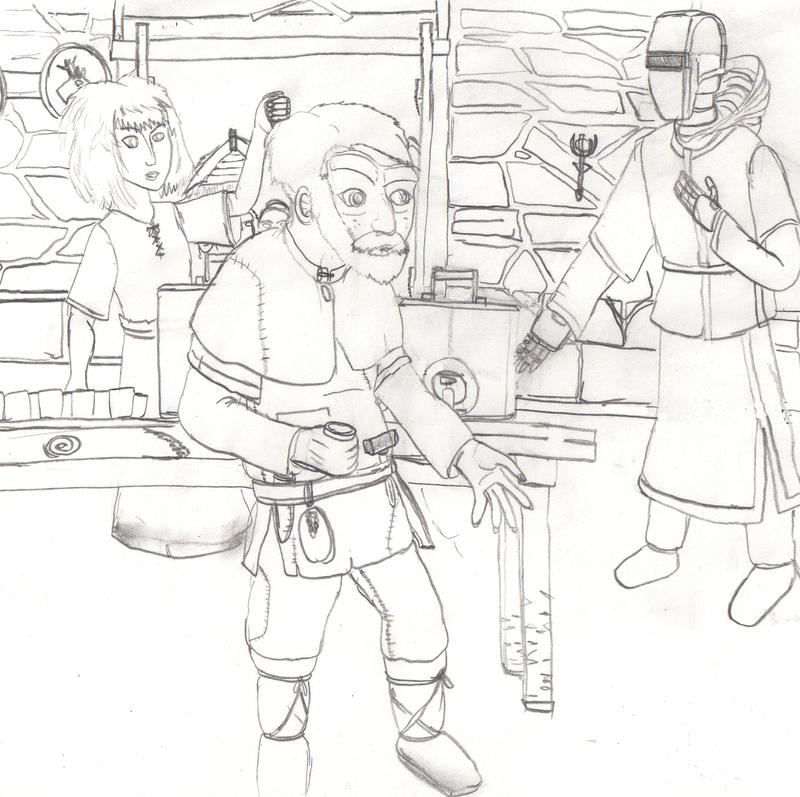
With Dalatyr under their control, its new machine overlords began to secure their objective. They sent a message to the satellite village, delivered by Drive along with a witness and Heisenoff's head, instructing them to inform of the change of regime. They were offered a choice, submit to their rule or die. Each village had only two or three men each guarding it and in any case, swearing fealty to a force which could take on forty three armed men and had the power that their weapons had was a good bet. The forces that had left Dalatyr raiding did not receive word of the fall of their home for five days, at which point they had faced some casualties and their captain decided that it was best to simply take a new village and cut their losses.
To secure their new base of operations, the Survivors began to move material from their base. The fabrication equipment, the reactor, the other Survivors, the captives, the crawlers were bit by bit carted over under escort and unloaded into the Great Hall. They also set up a still there to keep the liquor flowing. To make sure that their town was safe and to build up the loyalty of their followers, they kept guard of the towns and the surrounding areas. Two recon drones patrolled the skies at all time, searching for the many threats of this land. Gangs of bandits that attacked merchants raided and farms as well as the forces of the various warlords. Any of which who attempted to attack would face a formidable and swift response, a group of Survivors would sally forth to engage them. First on foot, then after learning how to make use of them, on horseback. They often wore chainmail and helmets while doing so, as well as carrying swords. While the armor did improve durability somewhat and the sword did make dispatching foes easier in close quarters, they were mainly used for the image as a deterrent. In the dark, they were unmatched, as a night raiding party found out to their regret. Bandit camps nearby Dalatyr hidden in the forest were also cleared out.
The result of the vigil of the Survivors was that the harvest of the first year faced little damage from raiding. The removal of bandits from the area also contributed to an increase of merchants coming to Dalatyr, which became an island of tranquility. But this was merely the beginning of their work.
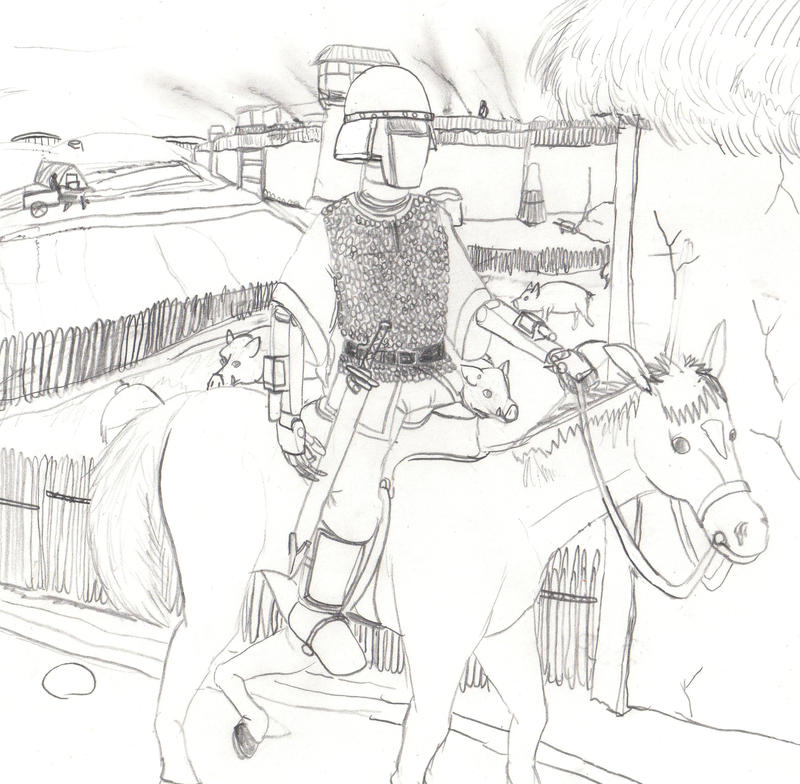
However, despite the formidably of their humanoid bodies in combat against the primitive warriors and bandits of this land and the edge that airborne recon gave them, the Survivors were quick to note the fact that they were insufficient to fill all the defensive needs. Their bodies required periodic maintenance and time to recharge, and were more or less necessary for interaction with the people of Dalatyr. The standard practice for the first year would be that six of them would be on combat patrol at one time. As such, they quickly recruited a fighting force from the general population to supplement their numbers in combat. The task of organizing this was given to Drive.
Recruitment of this new force was fairly simple, the eleven guards from the satellite villages joined freely, as did three guards who surrendered without a fight when they took Dalatyr. This was supplemented with a group of volunteers drawn from the general population, mostly young men who were keen on defending their homes, as well as receiving pay. In total forty six men were mustered for this force over about two months. Among them was Sven Smedth, son of Boris, who had developed a distinct distain for the warriors of this land.
The new force was a paid militia. Its members slept at home and had a more or less normal life at the end of the day, but drilled, patrolled and guarded. Arming them was not much of an issue. Heisenoff, like most of the Warlords of the Chaotic Coldlands had a waste not want not attitude to weaponry and there was a decent amount of spears, axes, swords and pole arms in the armory, far more than was expected or needed. The guards were allowed to take what they wanted as far as weaponry was concerned. There was a very large pile of helmets and more than enough shields to go around, but body armor was somewhat lacking. As far as new weapons went, crossbows were given priority production during the first summer. The resulting arsenal was hodgepodge, but effective enough at guarding the gates, the walls and providing backup. In turn for their service, they were paid in scrip which could be exchanged for food from the granary and larders as well as liquor, coal, cloth and a range of goods from a public store, which latter increased in scale. To set them apart from previous warriors, they were given uniforms. This started off with a simple greenish brown wool jacket with pockets and rank insignia and a belt.
This force was defensive in nature, its goal was to man the towers, guard the gates and the mine, patrol against raiders and serve as a strategic reserve. They did see some combat against bandits and a few raids (which resulted in two deaths), but they were never used offensively during the first year. They also did their share of odd jobs around the place when there was no signs of danger and guarding was being done by someone else. Of these, Sven became the keenest in these duties and was among the first of the new recruits to be promoted and was given him the first of the new crossbows.
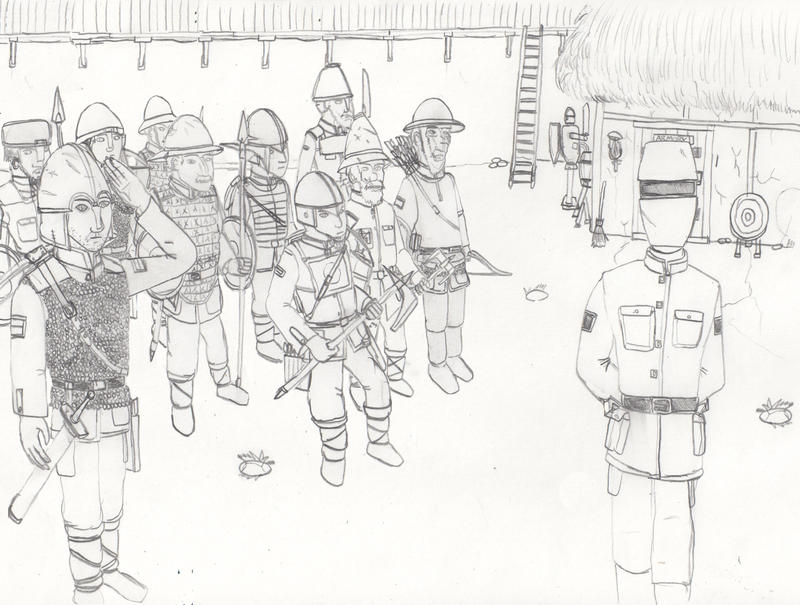
However, while defense of Dalatyr and its small realm was important to the Survivors, that was merely securing what few assets they had gained against the wild forces of this land. They quickly began work on their projects. Among the first of which was to make up for an area where they were dearly lacking in production. They could process metals from the local soil, minerals and recycled native tools using their material processor, but at most they could create a couple of kilograms of finished product a day.
Five days after the Survivors had taken the town, work began on a major project. An area outside of the town was soon sectioned off and a palisade was erected around it by crawlers, captives, militiamen and by townspeople and farmers called up for corvee labour duty. This was completed in a couple of weeks and then work on the main project began. Stone was used for the base, while homemade bricks fired in a newly made brick kiln was used for the upper levels. Various shacks and shelters were set up around it, including what looked to the natives to be a guard tower next to it. This creation took six months to complete. A towering conical smokestack with a couple of holes in it. Supernova told the townspeople that it was a furnace, like those used in a forge and that it would benefit them immensly.
A team of general labourers were employed to run it, at first at the oversight of one of the Survivors, but after a few weeks a competent Forman was selected. A mixture of Coal, limestone gravel and iron ore was fed into the device from the top while a fan system that the Survivors put together pumped in a constant supply of air into the machine. The product of this system was large quantities of slag (which was collected, cooled, broken down and used to cover the dirt pathways that had been dignified with the name of road) and liquid iron, which ran out like glowing water. Boris the Blacksmith was amazed when he saw the results. He was even further amazed by the next device that they created. After some testing of the material, they cast a device using pots, which when assembled was a pivoted cauldron which blasted the molten iron with air from holes in its underside and created molten steel. The machine worked day and night, producing ingots for forges and various shapes.
The surrounding warlords were somewhat curious about the Survivors, but disregarded what they did as being a waste of time. They saw them as powerful and formidable beings, no doubt about that. They lost numerous able bodied warriors in raids against them. But they were few and did not launch incursions into their lands. They conquered Dalatyr by trickery. They saw the militia that they raised as a pitiful group of peasants and townspeople given weapons and jackets, not real warriors. They saw the blast furnace that they erected as a novelty and when they could muster their forces something that would not save them. They had little knowledge or concern about manufacturing. They knew blacksmiths needed charcoal, metal and forges, that fire was involved and it took them time to make things. But if you wanted them to be more productive, you either enticed them with a reward for being timely or more often kicked them and threatened their families if they dared to not finish their work by the full moon and things to that effect. They had no idea of how this would change the balance of power.
